I'm not certain on how it works, but if the Crimean War triggers, the Congress of Berlin, the one that devides the Balkans, is guaranteed to happen. But since you're a GP and you have resisted any demand, I don't know what will happen now
The Most Sublime Porte - An Ottoman AAR
- Thread starter Riotkiller
- Start date
-
We have updated our Community Code of Conduct. Please read through the new rules for the forum that are an integral part of Paradox Interactive’s User Agreement.
You are using an out of date browser. It may not display this or other websites correctly.
You should upgrade or use an alternative browser.
You should upgrade or use an alternative browser.
Threadmarks
View all 63 threadmarks
Reader mode
Reader mode
Recent threadmarks
Chapter Fifty-Four: New Challenges (1928-1929) Chapter Fifty-Five: The Ottoman Golden Age (1930-1934) Chapter Fifty-Six: Scandal and Conflict (1934-1937) Chapter Fifty-Seven: The Caucasian War (Part I) Chapter Fifty-Eight: The Caucasian War (Part II) Chapter Fifty-Nine: The End of an Era (1938-1940) Chapter Sixty: The Bulldog Imperilled (1939-1943) Chapter Sixty-One: Troublesome Greeks (1943-1945)I believe that the Congress of Berlin only triggers if the Ottoman Empire isn't a Great Power (definitely) or a Secondary Power (Unsure). I think it can trigger regardless of what happens regarding Crimea, though the prestige boost I got from resisting the French helped regain GP status regardless. Of course, ideally, I will avoid it firing at all, but we shall have to wait and see for quite a while to be sure of thatI'm not certain on how it works, but if the Crimean War triggers, the Congress of Berlin, the one that devides the Balkans, is guaranteed to happen. But since you're a GP and you have resisted any demand, I don't know what will happen now
Chapter Eight: The House of Rashid and the House of Saud (1854-1856)
Following the outbreak of the American Civil War, the Sublime Porte moved to establish relations behind the scenes with the Confederate States of America. Whilst neither military nor financial support would be immediately forthcoming - as Grand Vizier Resid Pasha viewed either as an obscene waste of finite resources - emissaries were sent to observe the conflict, with the Porte prepared to offer financial assistance and investment only if it became clear that the Confederates were winning. As 1854 progressed into winter, however, the conflict appeared to be leaning toward a Union victory, despite them making far slower progress than they had initially envisaged.
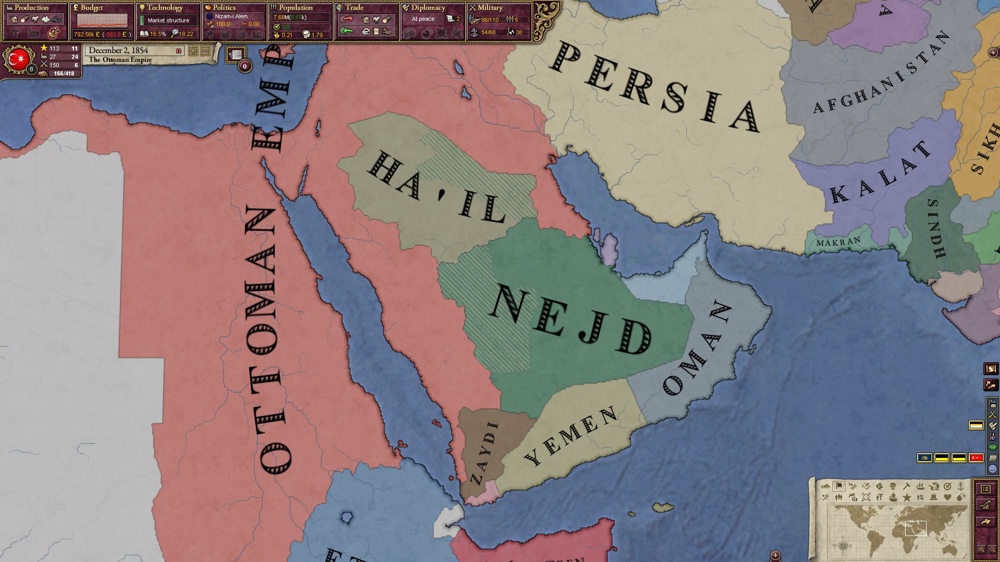
The Arabian Civil War (December 2nd 1854)
And so, the Porte decided to move its focus back to lands closer to home. A far smaller scale conflict had begun on the borders of the Empire, when the Arabian tribes under the House of Saud in the Nejd had launched a civil war to unite the Arabian tribes by conquering the Emirate of Ha’il, and its rulers from the House of Rashid. Whilst the territories of both were inhospitable backwaters, the consequences of a hostile Arabian union could be very damaging to the Ottoman Empire.
The House of Rashid in the Ha’il had long established friendly relations with the Porte. Based in the northern part of the Arabian Desert, the city of Ha’il was an important waypoint for Muslims making the Hajj pilgrimage, deriving much wealth from this. Whilst the entire Arabian Peninsula was nominally claimed by the Ottomans; the recognition of our inability to control it meant that the Emirate of Ha’il was a welcome ally in the region. As a relatively secular and open society, they fully recognised the Ottoman Sultan as the Caliph of Islam.
The House of Saud in the Emirate of Nejd, on the other hand, were sworn enemies of the Porte. The “First Saudi State”, the Emirate of Diriyah, had been founded in the 18th century after an alliance had formed between Ibn Saud and Muhammad ibn Abd al-Wahhab. Al-Wahhab founded and espoused the ultraconservative salafist school of Islam known as Wahhabism, abhorring idolatry and denouncing the Ottoman Caliphate as illegitimate.

The flag of our hated Saudi enemies, the Emirate of Nejd
Spreading from its capital in Riyadh, the Emirate of Diriyah had occupied much of the Arabian Peninsula, including the holy cities of Mecca and Medina. In 1802 they had sacked the Shiite holy city of Karbala in Iraq, massacring the local residents, whilst also launching many attacks on Ottoman trade caravans. Sultan Mustafa IV had responded by commanding Muhammad Ali Pasha of Egypt to destroy the Saudis in 1807, although Ali Pasha had not begun the campaign until 1811 under the rule of Mahmud II. The Saudi War lasted a further seven years before Ibrahim Pasha advanced to Riyadh and defeated the First Saudi State.
After the defeat of the Saudis, the Egyptians had occupied Arabia for nearly a decade before being expelled by a local uprising, leading to the rise of the Emirate of Nejd, known as the “Second Saudi State”. Whilst Egypt had maintained superiority over Hedjaz, the Saudis had again taken control of much of the Arabian interior. In 1836 the Ottoman Empire had seized the key fortress of Qatif from the Saudis, but the Saudis had again retreated into the Nejd. Since then, whilst Ottoman control had been reasserted over the Hedjaz and the Holy Cities, Nejd had continued to espouse their vitriolic Wahhabism and decry the Caliph and our allies in the Ha’il.
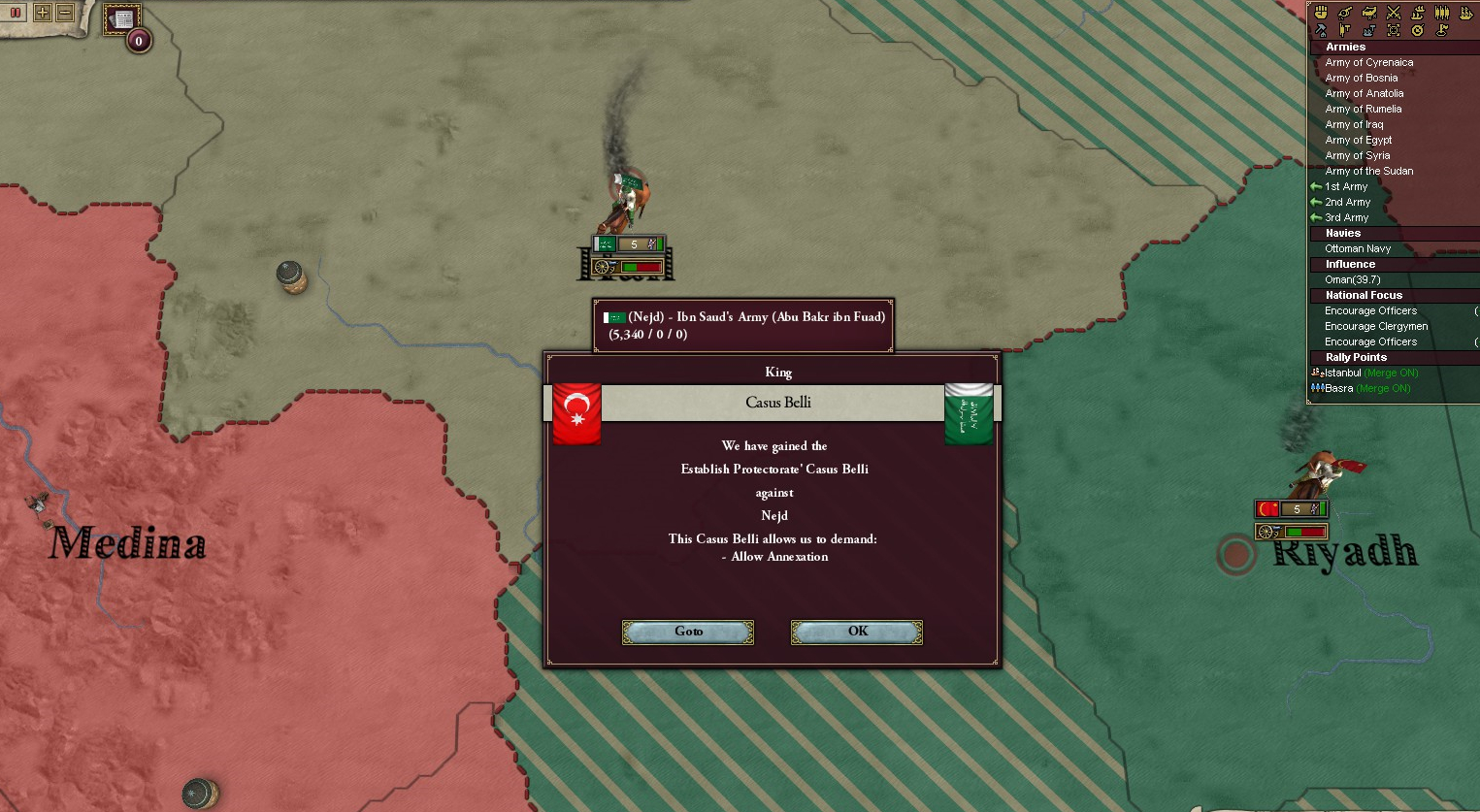
The Sublime Porte considers a military intervention in the Nejd (February 18th 1855)
As a result, the Porte was keen to ensure that the Rashidis were successful in the Arabian Civil War, and subsidies were immediately sent to help fund their war effort. Given the low population density of Arabia, this wasn’t too much of a drain on Ottoman finances, but would not guarantee a Rashidi victory.
Consequently, a backup plan was formed to begin a military intervention and take direct control of the Nejd, should the House of Saud look likely to win the war. This option was not preferred due to the hostile terrain and absence of worthwhile resources in the territory, but was vastly superior to having a hostile Saudi state control the whole Arabian interior: From where they would inevitably once again begin eyeing up the Islamic Holy Cities.
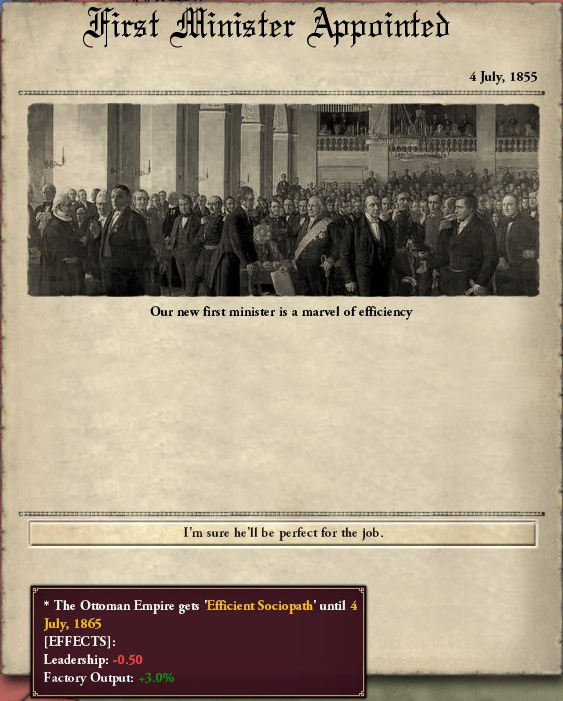
Grand Vizier Mustafa Naili Pasha appointed (July 4th 1855)
In the meantime, Grand Vizier Resid Pasha stood down on July 4th 1855, citing stress from the constant pressures of the job. He departed on good terms with the Sultan, and took up his old post as Ambassador to London. He was replaced as Grand Vizier by Mustafa Naili Pasha, an Albanian who had previously been governor of Crete. A cautious member of the Conservative faction, Naili Pasha was in favour of efficiency savings in the new industrial factories, deploying a policy known as “austerity” to reduce State spending after a large deficit had arisen in recent years.
Naili Pasha had big shoes to fill, after the successful rule of Resid Pasha, but his advanced age and lack of Resid’s vigour made it difficult for him to achieve much. The Rashidis had gained the upper hand in the Arabian Civil War after capturing Riyadh and defeating the Saudi forces that had besieged Ha’il, so the invasion of Nejd was kept on the backburner in 1855. And by March 1856, after less than a year in the job, Naili Pasha was dead.
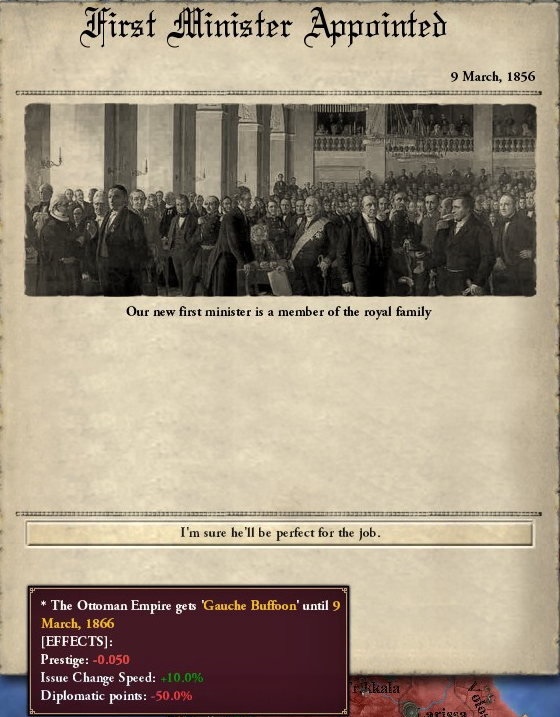
Grand Vizier Abdulaziz Osmanli's appointment upsets many liberals (March 9th 1856)
Frustrated by the instability in the Porte, Sultan Abdulmejid turned to his brother, Abdulaziz, to take over the position of Grand Vizier. Whilst highly unusual in Ottoman governance, Abdulaziz was not confined to a distant palace like close relatives of Sultans often were, and got on well with his brother. The nepotism shown by Sultan Abdulmejid nonetheless shocked many Western observers; flying in the face of many of the modernisations undertaken by the Porte in recent years – and Abdulaziz’s awkward manner rarely endeared him to them, either.
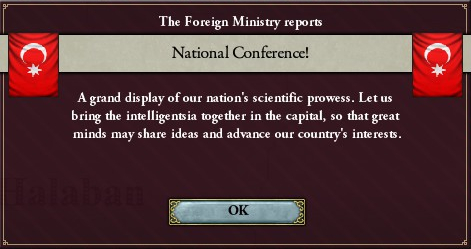
Grand Vizier Abdulaziz calls a National Conference in Istanbul (June 29th 1856)
Grand Vizier Abdulaziz made few changes to policy, however - and the Sultanate of Muscat & Oman was once more brought into the Ottoman Sphere of Influence in April, for the first time since our return to the status of a Great Power. This was followed in June by Abdulaziz calling for a National Conference; gathering many scientists in Istanbul to spearhead technological advances, whilst simultaneously easing relations with the Liberal members of the Porte - who had been far from pleased by his rise to power.
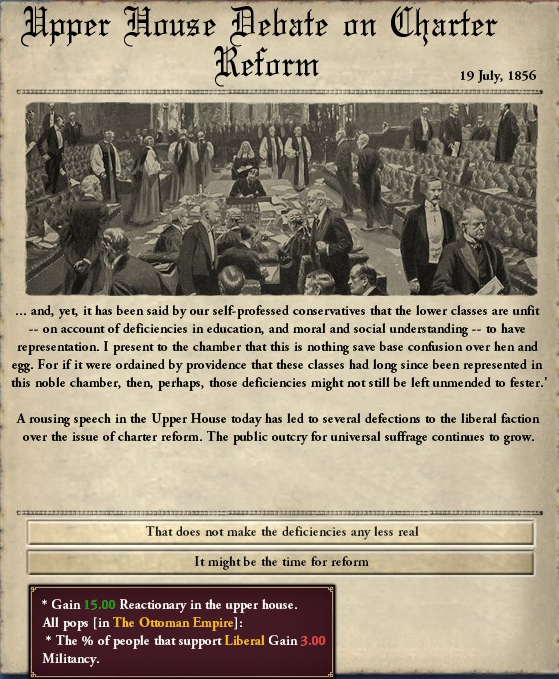
Grand Vizier Abdulaziz blocks attempts to extend the vote to people (July 19th 1856)
The Liberals followed this up by suggesting that the time was ripe for elections to take place in the Empire, triggering a rousing debate in the Porte. Abdulaziz eventually came down on the side of the Conservatives, with neither him nor the Sultan inclined to enfranchise the people at this point in time. This consequently outraged the Liberals, with increased tensions noticeable throughout the Capital.
But while the Arabian Civil War continued inconclusively during 1856, the long Ottoman Peace was about to end. On September 4th 1856, the Habsburg Empire out of the blue abruptly called upon the Pact of the Great Dynasties. A war with the Kingdom of Prussia was suddenly upon us.
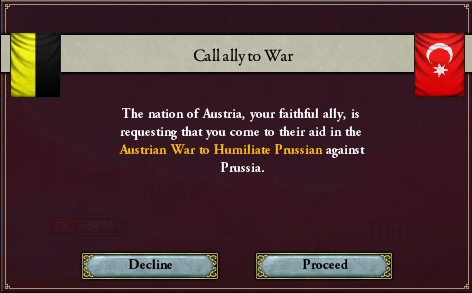

The Arabian Civil War (December 2nd 1854)
The House of Rashid in the Ha’il had long established friendly relations with the Porte. Based in the northern part of the Arabian Desert, the city of Ha’il was an important waypoint for Muslims making the Hajj pilgrimage, deriving much wealth from this. Whilst the entire Arabian Peninsula was nominally claimed by the Ottomans; the recognition of our inability to control it meant that the Emirate of Ha’il was a welcome ally in the region. As a relatively secular and open society, they fully recognised the Ottoman Sultan as the Caliph of Islam.
The House of Saud in the Emirate of Nejd, on the other hand, were sworn enemies of the Porte. The “First Saudi State”, the Emirate of Diriyah, had been founded in the 18th century after an alliance had formed between Ibn Saud and Muhammad ibn Abd al-Wahhab. Al-Wahhab founded and espoused the ultraconservative salafist school of Islam known as Wahhabism, abhorring idolatry and denouncing the Ottoman Caliphate as illegitimate.

The flag of our hated Saudi enemies, the Emirate of Nejd
Spreading from its capital in Riyadh, the Emirate of Diriyah had occupied much of the Arabian Peninsula, including the holy cities of Mecca and Medina. In 1802 they had sacked the Shiite holy city of Karbala in Iraq, massacring the local residents, whilst also launching many attacks on Ottoman trade caravans. Sultan Mustafa IV had responded by commanding Muhammad Ali Pasha of Egypt to destroy the Saudis in 1807, although Ali Pasha had not begun the campaign until 1811 under the rule of Mahmud II. The Saudi War lasted a further seven years before Ibrahim Pasha advanced to Riyadh and defeated the First Saudi State.
After the defeat of the Saudis, the Egyptians had occupied Arabia for nearly a decade before being expelled by a local uprising, leading to the rise of the Emirate of Nejd, known as the “Second Saudi State”. Whilst Egypt had maintained superiority over Hedjaz, the Saudis had again taken control of much of the Arabian interior. In 1836 the Ottoman Empire had seized the key fortress of Qatif from the Saudis, but the Saudis had again retreated into the Nejd. Since then, whilst Ottoman control had been reasserted over the Hedjaz and the Holy Cities, Nejd had continued to espouse their vitriolic Wahhabism and decry the Caliph and our allies in the Ha’il.

The Sublime Porte considers a military intervention in the Nejd (February 18th 1855)
As a result, the Porte was keen to ensure that the Rashidis were successful in the Arabian Civil War, and subsidies were immediately sent to help fund their war effort. Given the low population density of Arabia, this wasn’t too much of a drain on Ottoman finances, but would not guarantee a Rashidi victory.
Consequently, a backup plan was formed to begin a military intervention and take direct control of the Nejd, should the House of Saud look likely to win the war. This option was not preferred due to the hostile terrain and absence of worthwhile resources in the territory, but was vastly superior to having a hostile Saudi state control the whole Arabian interior: From where they would inevitably once again begin eyeing up the Islamic Holy Cities.

Grand Vizier Mustafa Naili Pasha appointed (July 4th 1855)
Naili Pasha had big shoes to fill, after the successful rule of Resid Pasha, but his advanced age and lack of Resid’s vigour made it difficult for him to achieve much. The Rashidis had gained the upper hand in the Arabian Civil War after capturing Riyadh and defeating the Saudi forces that had besieged Ha’il, so the invasion of Nejd was kept on the backburner in 1855. And by March 1856, after less than a year in the job, Naili Pasha was dead.

Grand Vizier Abdulaziz Osmanli's appointment upsets many liberals (March 9th 1856)
Frustrated by the instability in the Porte, Sultan Abdulmejid turned to his brother, Abdulaziz, to take over the position of Grand Vizier. Whilst highly unusual in Ottoman governance, Abdulaziz was not confined to a distant palace like close relatives of Sultans often were, and got on well with his brother. The nepotism shown by Sultan Abdulmejid nonetheless shocked many Western observers; flying in the face of many of the modernisations undertaken by the Porte in recent years – and Abdulaziz’s awkward manner rarely endeared him to them, either.

Grand Vizier Abdulaziz calls a National Conference in Istanbul (June 29th 1856)
Grand Vizier Abdulaziz made few changes to policy, however - and the Sultanate of Muscat & Oman was once more brought into the Ottoman Sphere of Influence in April, for the first time since our return to the status of a Great Power. This was followed in June by Abdulaziz calling for a National Conference; gathering many scientists in Istanbul to spearhead technological advances, whilst simultaneously easing relations with the Liberal members of the Porte - who had been far from pleased by his rise to power.

Grand Vizier Abdulaziz blocks attempts to extend the vote to people (July 19th 1856)
The Liberals followed this up by suggesting that the time was ripe for elections to take place in the Empire, triggering a rousing debate in the Porte. Abdulaziz eventually came down on the side of the Conservatives, with neither him nor the Sultan inclined to enfranchise the people at this point in time. This consequently outraged the Liberals, with increased tensions noticeable throughout the Capital.
But while the Arabian Civil War continued inconclusively during 1856, the long Ottoman Peace was about to end. On September 4th 1856, the Habsburg Empire out of the blue abruptly called upon the Pact of the Great Dynasties. A war with the Kingdom of Prussia was suddenly upon us.

- 1
Well this is a tough decision. To accede to the Austrian request would be a great strain on the Porte. To deny it would make the Ottomans formally friendless, and given Russia is doubtless hungry...
And there is always France as an additional worry.
And there is always France as an additional worry.
A war with a royal buffoon in the Grand Vizier's seat and liberal agitation on the rise -- all the ingredients in a recipe for turmoil.
While in game terms that 'Gauche Buffoon' First Minister is not great it is interesting on a character level and I love that you ran with it. 
So, war with Prussia. Will you be sending soldiers or ships to aid Austria?
So, war with Prussia. Will you be sending soldiers or ships to aid Austria?
The critical support that the Austrians gave to the Porte during the Oriental Crisis is still fresh in the minds of those in the Porte - Not only in terms of gratitude, but also as a potential sign of what Austrian support could do if they turned to an alliance with a direct rival of the Sultan's in Moscow or Paris. The alliance must be adhered to; and indeed shying away from it would also further harm our prestige, and our claims to being a Great Power instead of merely a regional player.Well this is a tough decision. To accede to the Austrian request would be a great strain on the Porte. To deny it would make the Ottomans formally friendless, and given Russia is doubtless hungry...
And there is always France as an additional worry.
Indeed, there are a great many risks. The Porte prepared extensively for a defensive war against a major power during the Levantine Crisis, but a war against a major enemy on foreign soil is something that the Empire has not fought for nearly a century.A war with a royal buffoon in the Grand Vizier's seat and liberal agitation on the rise -- all the ingredients in a recipe for turmoil.
Yeah, can't say I was too thrilled with it, but I'm trying to play as realistic as possible - the hardest part was trying to square a royal vizier with Ottoman historyWhile in game terms that 'Gauche Buffoon' First Minister is not great it is interesting on a character level and I love that you ran with it.
So, war with Prussia. Will you be sending soldiers or ships to aid Austria?
The Ottoman Navy is not in great shape - it has born the brunt of budget cuts whenever the deficit has risen, and the Porte has mostly focused on building a larger number of transport ships to allow for rapid response to rebellions. The Army, of course, is also stretched by the large distances of the Empire... But it could also be a good opportunity for the European armies of the Empire to get some fighting experience - something which they significantly lack as compared to the now battle-hardened troops in Egypt & Iraq.
Chapter Nine: The Austro-Prussian War of Honour (Part I)
By 1856, relations between the Kingdom of Prussia and the Austrian Empire had been deteriorating for a prolonged period of time over the so-called “German Question”. The House of Habsburg in Vienna traditionally saw themselves as the leaders of the German peoples, due to their control of the Holy Roman Empire for centuries, prior to its dissolution during the Napoleonic Wars. And although the von Hohenzollern’s of Prussia had established themselves as a rival power to the von Habsburg’s during the Seven Years War between 1756 and 1763, Austria remained the predominant German power after the Congress of Vienna in 1815.
The German Question - concerning the potential unification of the German Peoples into one nation - therefore initially began with Austria as the likely leader of a unified Germany, in what was called the “Grossdeutsche Losung” (Greater German Solution). The large non-German Habsburg lands, however, caused issue here: The Habsburgs were unwilling to give up their Empire, but a unification of German peoples could surely not include so many Italians, Slavs, and Magyars. This impasse gave opportunity for Prussia to stake a claim to the leadership of the Germans at the exclusion of Austria, with the protestants of northern Germany more inclined to support this “Kleindeutsche Losung” (Lesser German Solution) than the southern (and catholic) German states.
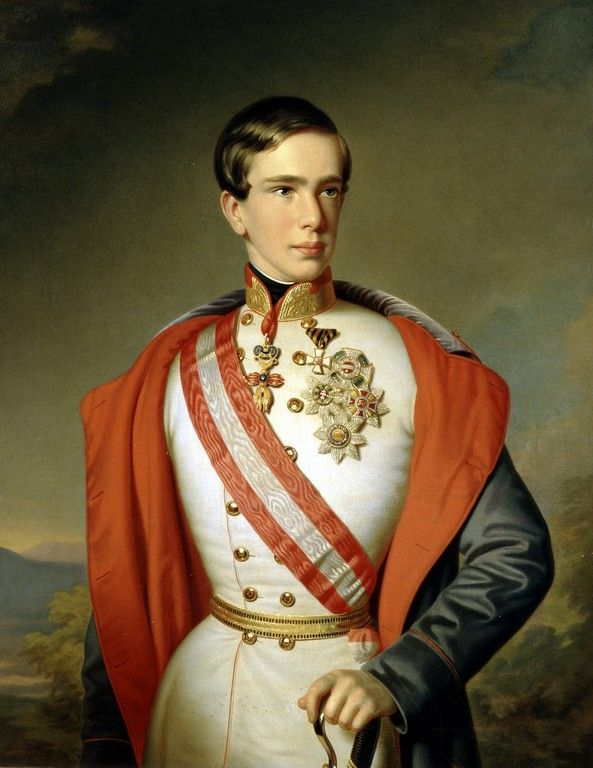
Emperor Franz Josef von Habsburg of Austria (1851)
The rise of the catholic Kingdom of Bavaria in the 1840s had brought it out of the Austrian sphere, as it attempted to establish itself as independent of either Austria or Prussia. Whilst a series of rebellions had since reduced the power of Bavaria, it remained unaligned in the German Question; and as such the Austrians were further isolated from their allies in the Grand Duchy of Baden and the Kingdom of Wurttemberg. As the Kingdom of Prussia began to exploit this Austrian weakness, the young Austrian Emperor Franz Josef in 1856 decided to strike the Prussians in order to maintain their status as the premier German power, while they still could. And so, on September 4th 1856, the Austro-Prussian War of Honour began.
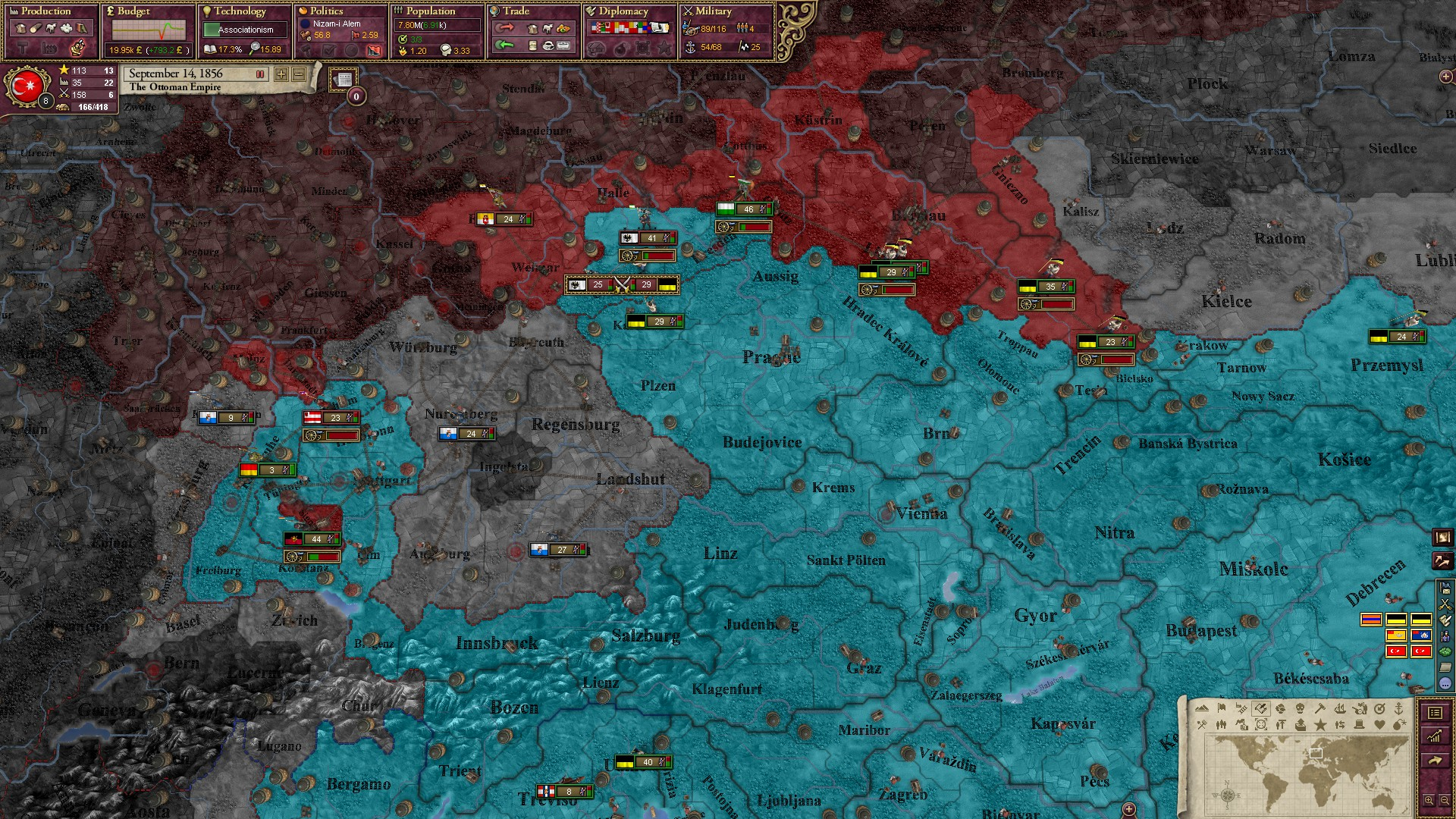
The belligerents and the situation in the Austro-Prussian War of Honour (September 14th 1856)
The Sublime Porte, distracted by the situation in Arabia, had not expected the German situation to go to war so rapidly; and consequently was completely unprepared to fight a major power in a war of aggression. Despite this, Sultan Abdulmejid remembered the valuable assistance that Austria had provided during the Oriental Crisis, and would not countenance reneging on the Pact of the Great Dynasties. The Ottoman Empire therefore immediately joined their Habsburg allies in declaring war on the Kingdom of Prussia, and called upon its vassals in the Principalities of Wallachia and Moldavia to do the same.
The Austrians; supported by their allies from Baden, Wurttemberg, the Duchy of Modena, and the Kingdom of Saxony, had begun the war with an invasion of Northern Silesia, whilst the Prussians had invaded Saxony in response. With the Ottoman Navy having been underfunded and underequipped for many years, the Porte therefore decided to send two armies to support the Austrians: The Army of Bosnia was to head to Saxony and support the Austrian defence or counterattacks there, whilst the Army of Anatolia would head to the main Silesian Front to support the Habsburg offensive. The Army of Rumelia would meanwhile be held in reserve in Europe, as the Porte were weary of leaving themselves open to a Russian attack. General Abdullah Pasha of the Army of Anatolia would have overall command of Ottoman forces in Austria.
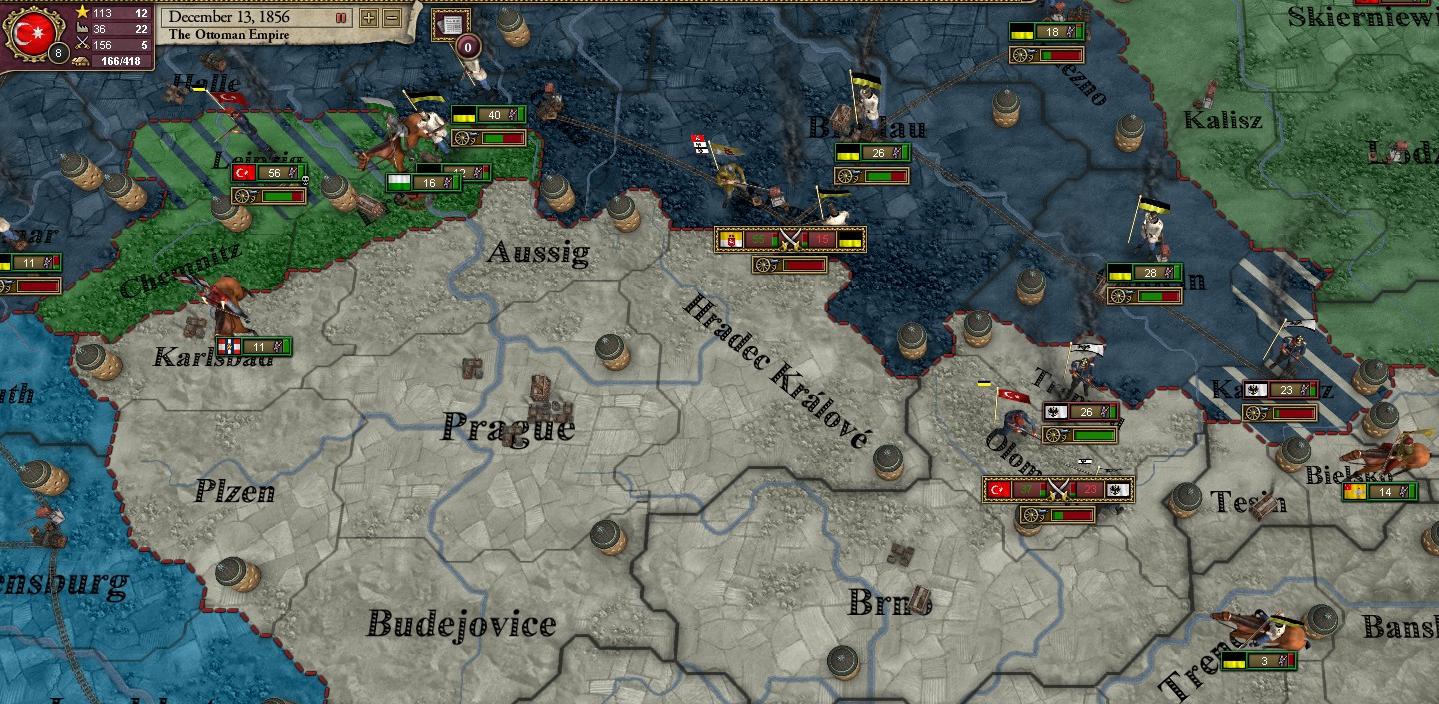
A chaotic frontline situation in the Austro-Prussian War of Honour (December 13th 1856)
Unfortunately, by the time Ottoman forces had reached the front in December 1856, the situation had changed considerably. The Prussians had diverted their forces in Saxony eastward, getting behind the Austrian lines to invade Moravia and Austrian Silesia, while Austria had counter-attacked in Saxony - with the Army of Bosnia therefore joining the Austrian forces in the liberation of Leipzig. The Army of Anatolia, however, came upon an ongoing battle between Austria and Prussia in Olomouc, Moravia. The Austrian forces had taken a battering prior to the Ottoman arrival, and were already in retreat as Abdullah Pasha arrived. After a brief engagement, the Ottomans joined the Austrians in retreating, but the disarray in the Austrian lines saw the Austrian and Ottoman armies separated in the confusion. The Prussians pursued the more numerous Ottoman forces, and on February 24th 1857 scored a crushing victory in the Battle of Liegnitz.
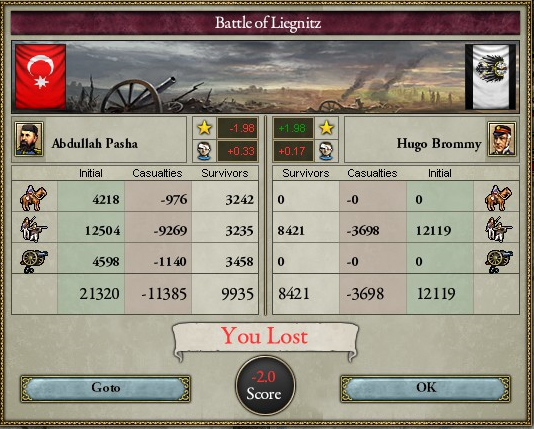
The Army of Anatolia is routed in the Battle of Liegnitz (February 24th 1857)
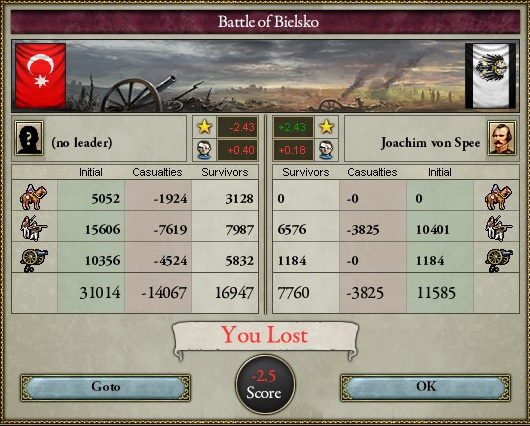
The Army of Bosnia is simultaneously defeated in the Battle of Bielsko (February 24th 1847)
Even worse, on the same day news reached Abdullah Pasha that the Army of Bosnia had also suffered a heavy defeat in Battle of Bielsko after attempting to advance into Prussia following the Saxon liberation. A string of Austro-Ottoman defeats had therefore seen momentum in the war swing heavily toward the Kingdom of Prussia by March 1857, despite the numerical inferiority of their armies. This was further illustrated in the devastating Battle of Prague, on May 22nd 1857. The Ottoman Army of Anatolia, retreating from Silesia alongside an Austrian army, had come upon a small Prussian force besieging the great city. Despite the combined Austro-Ottoman forces outnumbering the Prussians by more than 6:1, the Prussian General Hugo Brommy had ordered his men to stand firm no matter what, and our demoralised troops had broken within sight of victory after suffering enormous losses.
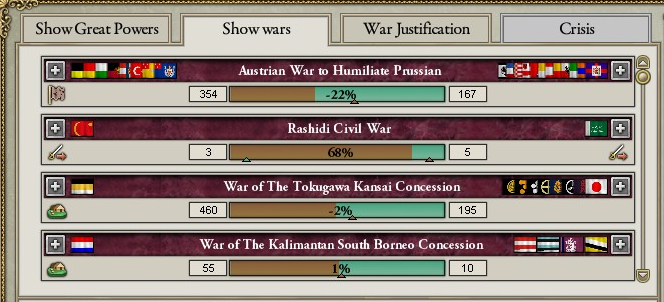
The international status of the Austro-Prussian War of Honour (March 27th 1856)
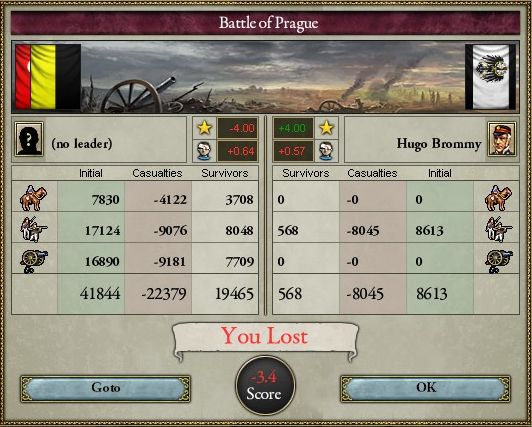
The Austro-Ottoman Alliance suffers a stunning defeat at Prague (May 22nd 1857)
Following this string of catastrophic engagements, the Army of Anatolia had been broken down to less than 30% of its fighting strength. The Porte therefore withdrew it from the fighting, but Grand Vizier Abdulaziz - wary of losing face by withdrawing from fighting entirely - decided to authorise the Army of Rumelia to be sent to the frontline in its place. The Army of Rumelia would be led by the newly promoted general Iskender Pasha; who had, as a divisional commander at Leipzig and Bielsko, been one of the few bright spots of an otherwise appalling campaign.
Abdulaziz had however taken the pragmatic step of instructing Iskender to avoid launching further offensives without Austrian support to minimise further casualties… And so, in August 1857, the Armies of Bosnia and Rumelia were moved into defensive positions in Bohemia. The Kingdom of Saxony had recently surrendered to the Prussians and withdrawn from the war, leaving that sector of the front quiet, as the Prussians had agreed not to trespass on Saxon territory as part of the White Peace they had negotiated. The Prussians still controlled the Bohemian city of Aussig however, and whilst the Silesian Front remained a quagmire, the Prussians had launched a major offensive far to the west in an attempt to knock Baden & Wurttemberg out of the war as well.
The Austrians, for their part, had succeeded in knocking a number of minor Prussian allies out of the war in the west prior to the Prussian counterattack, and due to their numerical superiority had managed to absorb the losses in the east, without losing much ground in Silesia or Moravia. It was clear that this war was far from over, but both Vienna and Istanbul knew that any major success would require a sharp turnaround in the performance of their armies against their Prussian counterparts - and it would have to happen soon.
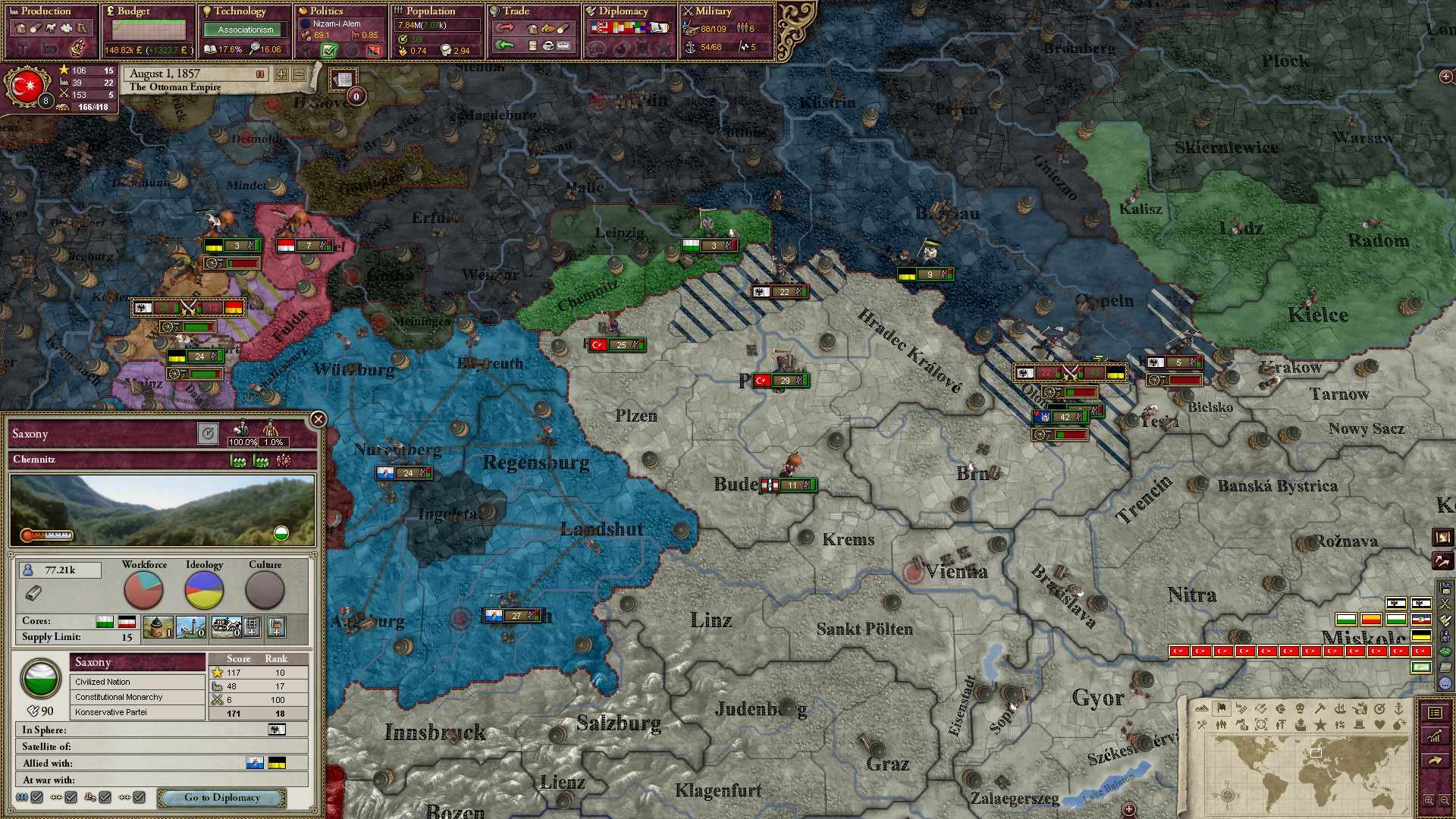
The Austro-Prussian War of Honour after the Saxon Surrender (August 1st 1857)
The German Question - concerning the potential unification of the German Peoples into one nation - therefore initially began with Austria as the likely leader of a unified Germany, in what was called the “Grossdeutsche Losung” (Greater German Solution). The large non-German Habsburg lands, however, caused issue here: The Habsburgs were unwilling to give up their Empire, but a unification of German peoples could surely not include so many Italians, Slavs, and Magyars. This impasse gave opportunity for Prussia to stake a claim to the leadership of the Germans at the exclusion of Austria, with the protestants of northern Germany more inclined to support this “Kleindeutsche Losung” (Lesser German Solution) than the southern (and catholic) German states.

Emperor Franz Josef von Habsburg of Austria (1851)
The rise of the catholic Kingdom of Bavaria in the 1840s had brought it out of the Austrian sphere, as it attempted to establish itself as independent of either Austria or Prussia. Whilst a series of rebellions had since reduced the power of Bavaria, it remained unaligned in the German Question; and as such the Austrians were further isolated from their allies in the Grand Duchy of Baden and the Kingdom of Wurttemberg. As the Kingdom of Prussia began to exploit this Austrian weakness, the young Austrian Emperor Franz Josef in 1856 decided to strike the Prussians in order to maintain their status as the premier German power, while they still could. And so, on September 4th 1856, the Austro-Prussian War of Honour began.

The belligerents and the situation in the Austro-Prussian War of Honour (September 14th 1856)
The Sublime Porte, distracted by the situation in Arabia, had not expected the German situation to go to war so rapidly; and consequently was completely unprepared to fight a major power in a war of aggression. Despite this, Sultan Abdulmejid remembered the valuable assistance that Austria had provided during the Oriental Crisis, and would not countenance reneging on the Pact of the Great Dynasties. The Ottoman Empire therefore immediately joined their Habsburg allies in declaring war on the Kingdom of Prussia, and called upon its vassals in the Principalities of Wallachia and Moldavia to do the same.
The Austrians; supported by their allies from Baden, Wurttemberg, the Duchy of Modena, and the Kingdom of Saxony, had begun the war with an invasion of Northern Silesia, whilst the Prussians had invaded Saxony in response. With the Ottoman Navy having been underfunded and underequipped for many years, the Porte therefore decided to send two armies to support the Austrians: The Army of Bosnia was to head to Saxony and support the Austrian defence or counterattacks there, whilst the Army of Anatolia would head to the main Silesian Front to support the Habsburg offensive. The Army of Rumelia would meanwhile be held in reserve in Europe, as the Porte were weary of leaving themselves open to a Russian attack. General Abdullah Pasha of the Army of Anatolia would have overall command of Ottoman forces in Austria.

A chaotic frontline situation in the Austro-Prussian War of Honour (December 13th 1856)
Unfortunately, by the time Ottoman forces had reached the front in December 1856, the situation had changed considerably. The Prussians had diverted their forces in Saxony eastward, getting behind the Austrian lines to invade Moravia and Austrian Silesia, while Austria had counter-attacked in Saxony - with the Army of Bosnia therefore joining the Austrian forces in the liberation of Leipzig. The Army of Anatolia, however, came upon an ongoing battle between Austria and Prussia in Olomouc, Moravia. The Austrian forces had taken a battering prior to the Ottoman arrival, and were already in retreat as Abdullah Pasha arrived. After a brief engagement, the Ottomans joined the Austrians in retreating, but the disarray in the Austrian lines saw the Austrian and Ottoman armies separated in the confusion. The Prussians pursued the more numerous Ottoman forces, and on February 24th 1857 scored a crushing victory in the Battle of Liegnitz.

The Army of Anatolia is routed in the Battle of Liegnitz (February 24th 1857)

The Army of Bosnia is simultaneously defeated in the Battle of Bielsko (February 24th 1847)

The international status of the Austro-Prussian War of Honour (March 27th 1856)

The Austro-Ottoman Alliance suffers a stunning defeat at Prague (May 22nd 1857)
Following this string of catastrophic engagements, the Army of Anatolia had been broken down to less than 30% of its fighting strength. The Porte therefore withdrew it from the fighting, but Grand Vizier Abdulaziz - wary of losing face by withdrawing from fighting entirely - decided to authorise the Army of Rumelia to be sent to the frontline in its place. The Army of Rumelia would be led by the newly promoted general Iskender Pasha; who had, as a divisional commander at Leipzig and Bielsko, been one of the few bright spots of an otherwise appalling campaign.
Abdulaziz had however taken the pragmatic step of instructing Iskender to avoid launching further offensives without Austrian support to minimise further casualties… And so, in August 1857, the Armies of Bosnia and Rumelia were moved into defensive positions in Bohemia. The Kingdom of Saxony had recently surrendered to the Prussians and withdrawn from the war, leaving that sector of the front quiet, as the Prussians had agreed not to trespass on Saxon territory as part of the White Peace they had negotiated. The Prussians still controlled the Bohemian city of Aussig however, and whilst the Silesian Front remained a quagmire, the Prussians had launched a major offensive far to the west in an attempt to knock Baden & Wurttemberg out of the war as well.
The Austrians, for their part, had succeeded in knocking a number of minor Prussian allies out of the war in the west prior to the Prussian counterattack, and due to their numerical superiority had managed to absorb the losses in the east, without losing much ground in Silesia or Moravia. It was clear that this war was far from over, but both Vienna and Istanbul knew that any major success would require a sharp turnaround in the performance of their armies against their Prussian counterparts - and it would have to happen soon.

The Austro-Prussian War of Honour after the Saxon Surrender (August 1st 1857)
- 1
The Austro-Ottoman alliance is off to a rocky start there, with early defeats and a loss of ground in the opening campaigns of the war. Still, with fresh troops heading eastward to Silesia, perhaps there is still time for the situation to turn around...
I cannot help but feel that Bavaria is biding its time, quietly hoping that both participants will exhaust themselves so that they can swoop in from the wings and assert their own role as a leading force in Germany should either or both of the German powers find themselves ousted from Great Power status.
I cannot help but feel that Bavaria is biding its time, quietly hoping that both participants will exhaust themselves so that they can swoop in from the wings and assert their own role as a leading force in Germany should either or both of the German powers find themselves ousted from Great Power status.
Yes, while the Ottoman forces were not expected to be able to match the Prussians man for man, with reforms and advances having been focused on administration and industry in recent years, the sheer scale of the Prussian dominance has caused the Porte much concern - as has their similar successes over Austria.The Austro-Ottoman alliance is off to a rocky start there, with early defeats and a loss of ground in the opening campaigns of the war. Still, with fresh troops heading eastward to Silesia, perhaps there is still time for the situation to turn around...
I cannot help but feel that Bavaria is biding its time, quietly hoping that both participants will exhaust themselves so that they can swoop in from the wings and assert their own role as a leading force in Germany should either or both of the German powers find themselves ousted from Great Power status.
Bavaria staying out of this war could certainly prove very fruitful for it - especially if a prolonged stalemate should emerge. Whilst they have hovered just below Great Power status for some time, it's clear that their industrial power is very impressive - and should the war lead to an economic collapse for either Austria or Prussia, then Bavarian industry may be able to seize yet more market share for itself.
Those are some very tough losses.
I note the wonderful thing about the Battle of Prague though is how few Prussians survived that fight.
I note the wonderful thing about the Battle of Prague though is how few Prussians survived that fight.
That is true, but on the flip side, the fact that our forces broke when they were so close to victory made it that much more galling...Those are some very tough losses.
I note the wonderful thing about the Battle of Prague though is how few Prussians survived that fight.
Chapter Ten: The Austro-Prussian War of Honour (Part II)
General Iskender Pasha, during the early campaigns of the Austro-Prussian War of Honour, had come to a single fundamental conclusion: Ottoman forces could not compete against the Prussians on an even footing. During the Battle of Bielsko in February 1857, he had achieved some significant local success as a divisional commander by harrying the Prussian flank in a series of “hit and run” attacks as the main battle raged on. While this was nowhere near enough to rescue the situation for the Ottoman forces; it had drawn him to the attention of the Sublime Porte, and so when Grand Vizier Abdulaziz authorised the sending of the Army of Rumelia to the frontline in August 1857, Iskender Pasha was the general promoted to lead it.
Abdulaziz had also, in his usual crass style, subordinated the previous overall commanding officer Abdullah Pasha to Iskender. Abdullah, now in charge of the recuperating Army of Bosnia, had been publically humiliated by this turn of events, and accorded the “Young Upstart” Iskender Pasha very little respect as a result. Relations between the two generals were very tense, with Iskender also remembering how many of his comrades in arms had died under the command of Abdullah prior to his promotion. The Grand Vizier however paid no attention to this rivalry; instead heading back to the Capital to begin planning a new exhibition of Ottoman culture, despite some in the Porte cautioning what could come of such disharmony.
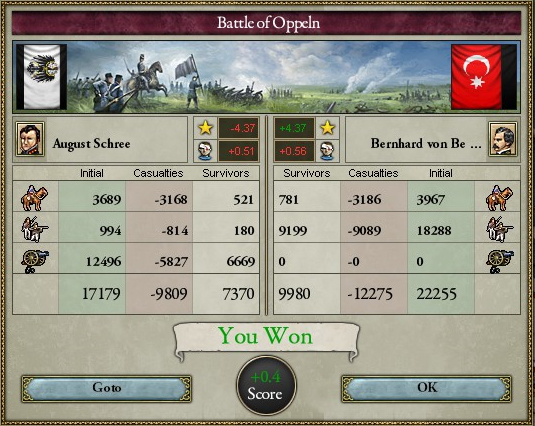
The Battle of Oppeln (September 14th 1857)
Upon reaching the front, Iskender found that the Prussian-occupied city of Aussig stood between the forces of himself and Abdullah. Abdullah urged an assault on the city; intending to use their superior numbers to trap and destroy the Prussians. Iskender however, holding true to his mantra of avoiding straight fights against prepared Prussian positions, instead sent Abdullah to support the latest Habsburg offensive on the Silesian Front. The Austro-Ottoman forces subsequently won the Battle of Oppeln in September 1857. Whilst the victory was insignificant in the grand scheme of the war, it did at least stop the rot in terms of defeats to the Prussians - providing a critical boost to Allied morale heading into the winter season.
Iskender himself maintained a defensive position around Prague, watching the Prussian movements and waiting for an opportunity to strike a more lasting blow. This finally came at the beginning of November 1857. The Prussian forces in Aussig had moved forward and begun besieging the fortress of Hradec Karlove, and their allies from the Duchy of Schleswig-Holstein had sent their army to support the new Prussian offensive. Heavy rain had turned the roads to mud in Bohemia, and Iskender Pasha took advantage to strike the Holstein Army at the Battle of Karlsbad on November 2nd. The enemy commander Lukas von Ravensberg soon began a retreat, but Iskender pursued and surrounded his forces near Plzen soon after. Ravensberg, alongside the entire Schleswig-Holstein forces, was forced to surrender in a hugely significant victory for the Austro-Ottoman forces.
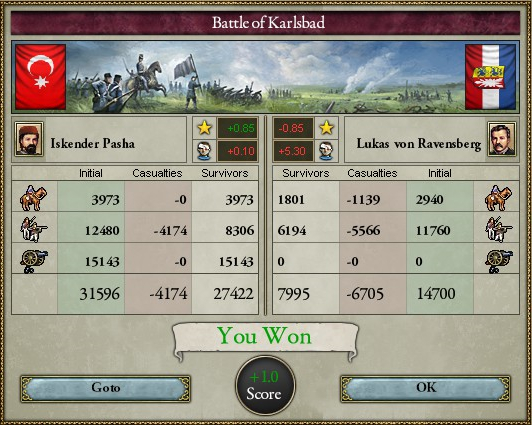
Iskender Pasha wins his first engagement as a general at the Battle of Karlsbad (November 2nd 1857)
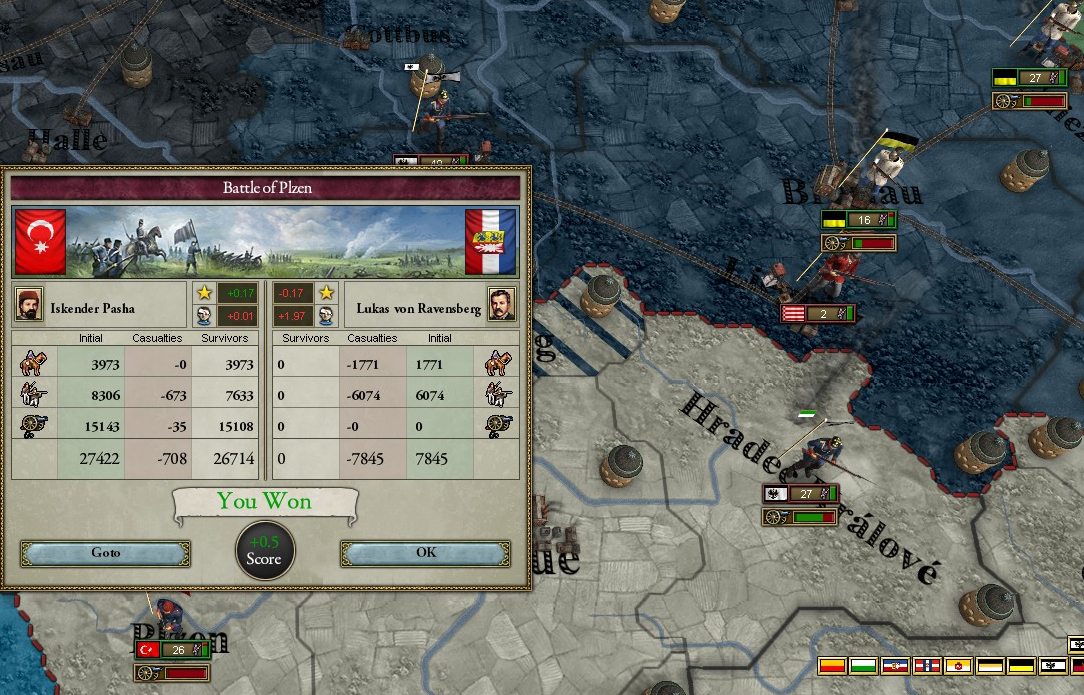
The Battle of Plzen and the front-line in Bohemia (November 13th 1857)
A month later, Iskender scored another convincing victory after defeating the forces of Oldenburg and Saxe-Meiningen at the Battle of Hradec Kralove: whilst in Silesia the fortress of Oppeln simultaneously surrendered to the allied forces besieging it. This ensured that 1857 ended on a high note, with the Prussians now increasingly isolated on the Northern Front of the war. The Sublime Porte was delighted; with Sultan Abdulaziz even being able to start turning his attention to other fronts, as the Arabian Civil War continued to drag on without conclusion. Any plans to intervene were short-lived however, as a series of riots over the appalling living conditions of large parts of the populace once again scrapped Ottoman plans for an intervention.
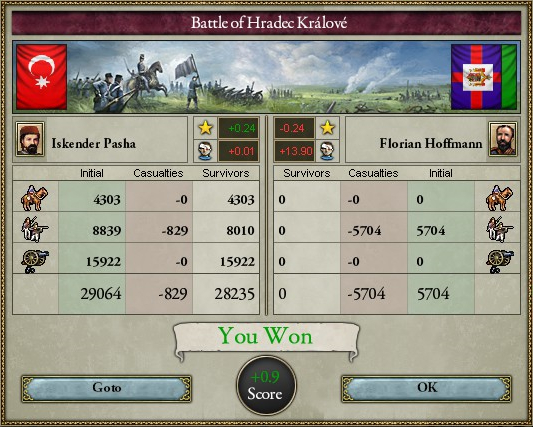
Iskender Pasha dispatched another German army at the Battle of Hradec Kralove (December 25th 1857)
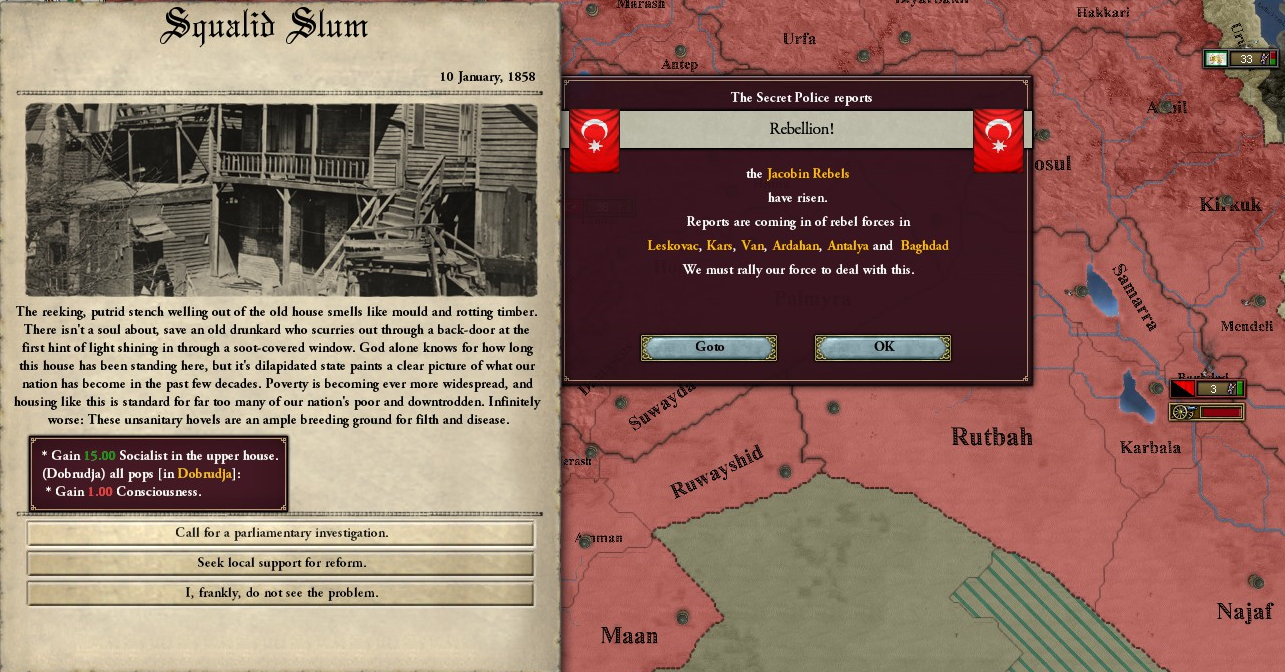
The minor Housing Riots of January 1858
The uprising, whilst minor and easily stamped out, reminded the Porte of the vulnerable position it was in with two armies committed so far away in Germany; and so Grand Vizier Abdulaziz settled for announcing his new - and exceedingly lavish - Istanbul Exhibition. The exhibition, alongside the new (and very well publicised) successes on the frontline, calmed the general populace down and prevented the uprising from spreading.
Meanwhile Abdullah Pasha, not to be outdone by Iskender, attacked another Prussian-Allied army on January 13th 1858. At the Second Battle of Olomouc (the very site of his humiliating defeat almost a year earlier), he attacked and drove back the forces of the Grand Duchy of Hesse-Darmstadt. This victory drove the final enemy forces out of Austria and back over the pre-war border with Prussia in the north, with the Prussian forces being forced heavily onto the defensive in Silesia.
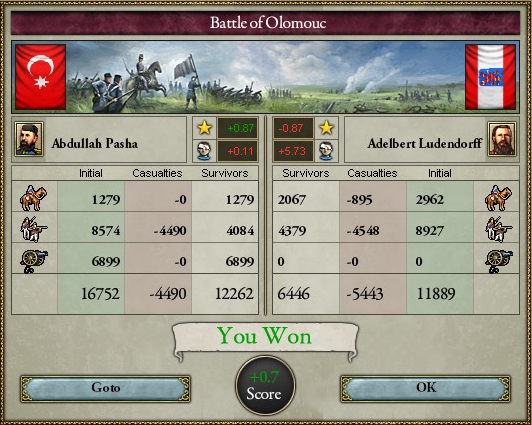
Abdullah Pasha gets his revenge at the Second Battle of Olomouc (January 13th 1858)
As a consequence of these significant victories, Grand Vizier Abdulaziz demanded that Iskender Pasha launch an offensive deep into Prussian territory in Spring 1858. The Prussians during winter 1857 had succeeded in breaking the Western Front, and both Baden and Wurttemberg had been forced to make peace. Abdulaziz therefore wanted the Austro-Prussian forces to surround the remaining Prussian forces in Silesia and force them to surrender, before the Prussians were able to manoeuvre all of their western forces back to the Northern Front. Iskender’s objections to this risky strategy were overruled, with the Austrians also eager to take the fight into Prussian lands, and so the Austro-Ottoman forces began an invasion of Prussian Poland.
Iskender’s feared outcomes were all too real, however. The Prussian General Hugo Brommy had already received fresh forces from the west, and on March 15th 1858 he attacked Iskender’s Army of Rumelia at it besieged the city of Posen. It was a massacre. The Army of Rumelia was almost obliterated, with casualties at a 10:1 ratio against their Prussian opponents, and only a very timely retreat by Iskender prevented its complete destruction. As the artillery units withdrew from the rear first, however, Iskender’s infantry and cavalry were mercilessly bombarded by their foes, and few survived uninjured. The Battle of Posen was possibly the heaviest Ottoman defeat since the Battle of Konya in 1832, and the near annihilation of the Empire’s foremost army utterly stunned the Porte. The battered remnants of Iskender’s Army of Rumelia were immediately withdrawn from the fighting, and this time the Porte would not send fresh forces to the front.
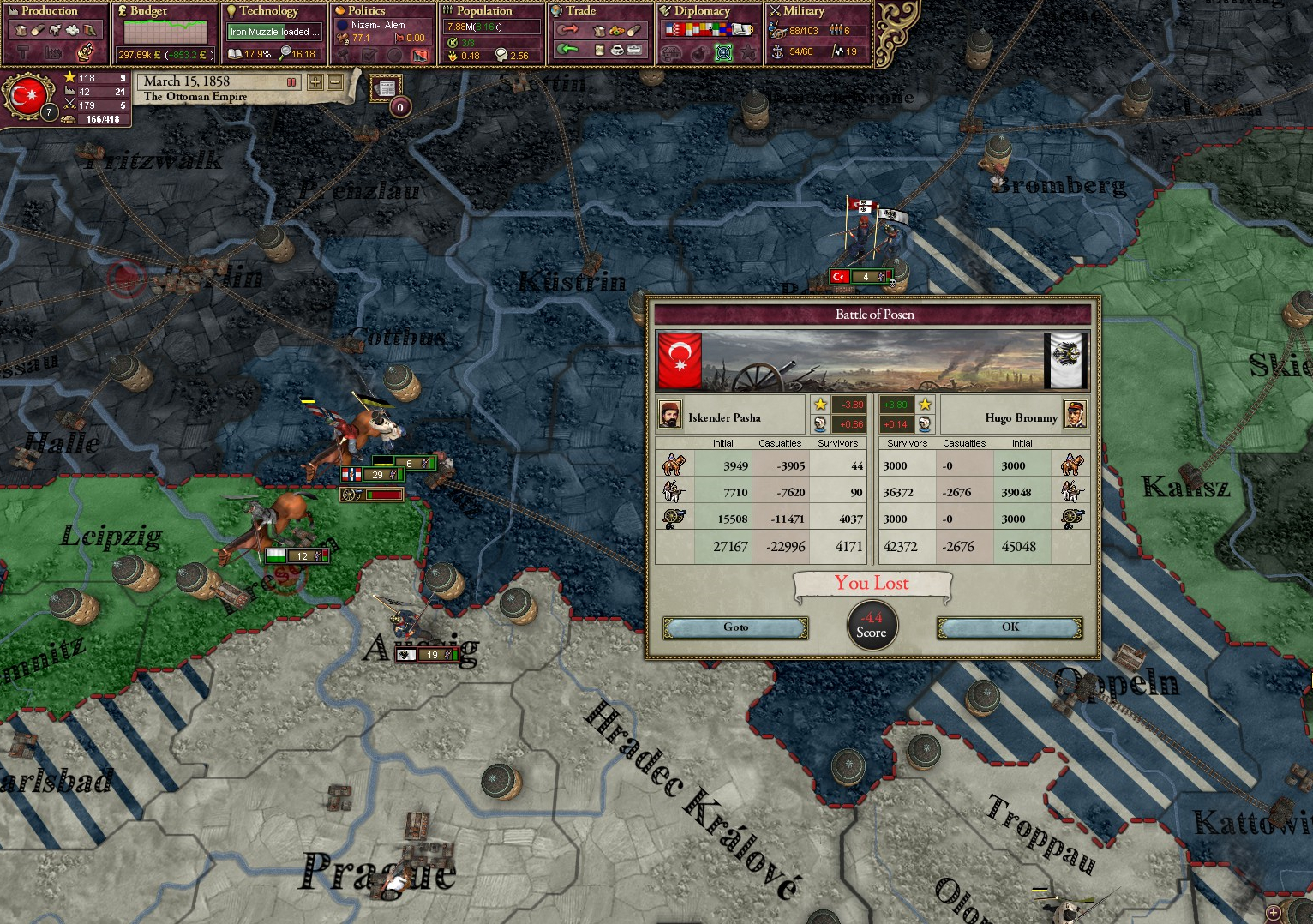
The Disaster of Posen (March 15th 1858)
Abdullah Pasha, who had undermined Iskender by supporting Abdulaziz’s call for the offensive in the first place, remained in charge of the Army of Bosnia with the instruction to remain on the defensive and avoid any engagements with the Prussians whatsoever. Ottoman pride was somewhat restored in July, when Abdullah all but annihilated the rest of Hesse-Darmstadt’s army in the Battle of Brno, but it was scant consolation. The Prussians scored another string of victories over Austrian forces in 1858, and by October Emperor Franz Josef was forced to sue for peace.
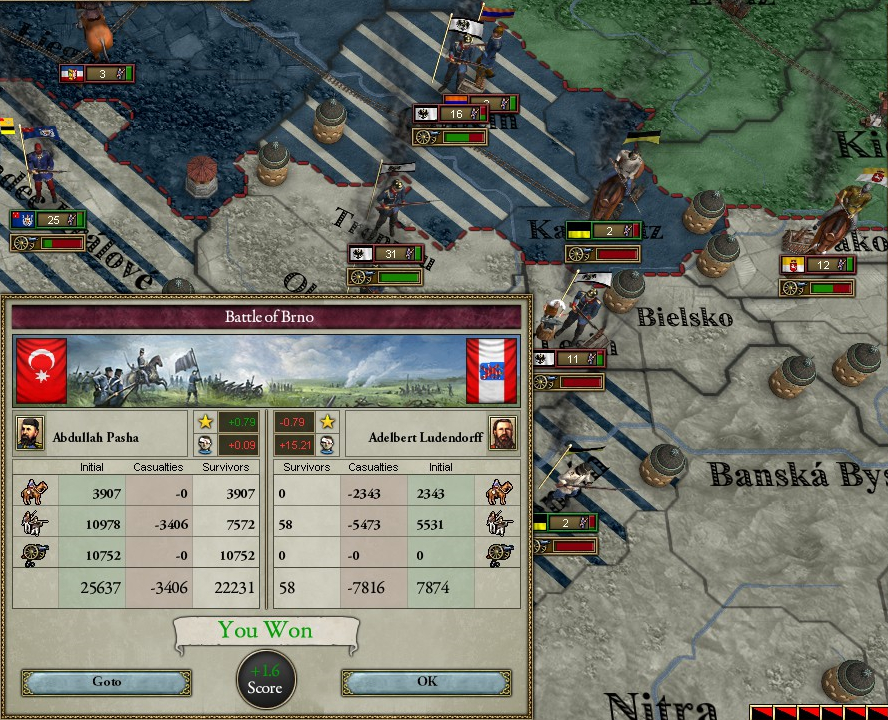
The Battle of Brno (July 18th 1858) marked the final Ottoman engagement in the Austro-Prussian War of Honour
The Prussians, exhausted and alone after the defeats of its North German allies, accepted the restoration of the status quo ante bellum with Austria, but it was clear to all that the Austrians had been defeated. No sooner had the Peace of Treppau been signed on October 30th 1858, the Prussians had led the formation of a North German Federation with the other protestant German states - including the former Austrian ally of the Kingdom of Saxony.
As for Austria itself, the repercussions were equally significant. Hungarian resentment had continued to simmer since the failed Revolution of 1848, and the defeat in the war had shown signs of sparking another serious rebellion. With Austrian hopes of unifying the German people under their leadership seemingly all but over, the Habsburg Imperial Council moved fast. In a great compromise with the Hungarian Nobles, the Empire of Austria was unified with the Kingdom of Hungary into a new Dual Monarchy. Whilst they would share a common defence policy; the Hungarians would have their own separate domestic laws and significant autonomy from Vienna. The Austro-Hungarian Empire was born.
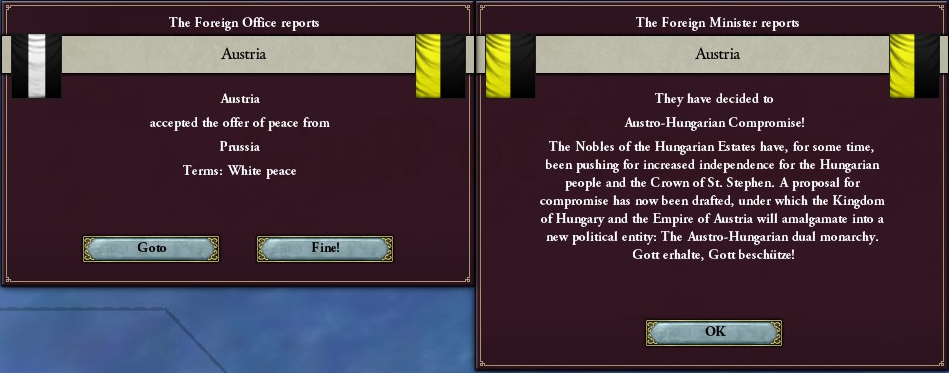
Abdulaziz had also, in his usual crass style, subordinated the previous overall commanding officer Abdullah Pasha to Iskender. Abdullah, now in charge of the recuperating Army of Bosnia, had been publically humiliated by this turn of events, and accorded the “Young Upstart” Iskender Pasha very little respect as a result. Relations between the two generals were very tense, with Iskender also remembering how many of his comrades in arms had died under the command of Abdullah prior to his promotion. The Grand Vizier however paid no attention to this rivalry; instead heading back to the Capital to begin planning a new exhibition of Ottoman culture, despite some in the Porte cautioning what could come of such disharmony.

The Battle of Oppeln (September 14th 1857)
Upon reaching the front, Iskender found that the Prussian-occupied city of Aussig stood between the forces of himself and Abdullah. Abdullah urged an assault on the city; intending to use their superior numbers to trap and destroy the Prussians. Iskender however, holding true to his mantra of avoiding straight fights against prepared Prussian positions, instead sent Abdullah to support the latest Habsburg offensive on the Silesian Front. The Austro-Ottoman forces subsequently won the Battle of Oppeln in September 1857. Whilst the victory was insignificant in the grand scheme of the war, it did at least stop the rot in terms of defeats to the Prussians - providing a critical boost to Allied morale heading into the winter season.
Iskender himself maintained a defensive position around Prague, watching the Prussian movements and waiting for an opportunity to strike a more lasting blow. This finally came at the beginning of November 1857. The Prussian forces in Aussig had moved forward and begun besieging the fortress of Hradec Karlove, and their allies from the Duchy of Schleswig-Holstein had sent their army to support the new Prussian offensive. Heavy rain had turned the roads to mud in Bohemia, and Iskender Pasha took advantage to strike the Holstein Army at the Battle of Karlsbad on November 2nd. The enemy commander Lukas von Ravensberg soon began a retreat, but Iskender pursued and surrounded his forces near Plzen soon after. Ravensberg, alongside the entire Schleswig-Holstein forces, was forced to surrender in a hugely significant victory for the Austro-Ottoman forces.

Iskender Pasha wins his first engagement as a general at the Battle of Karlsbad (November 2nd 1857)

The Battle of Plzen and the front-line in Bohemia (November 13th 1857)
A month later, Iskender scored another convincing victory after defeating the forces of Oldenburg and Saxe-Meiningen at the Battle of Hradec Kralove: whilst in Silesia the fortress of Oppeln simultaneously surrendered to the allied forces besieging it. This ensured that 1857 ended on a high note, with the Prussians now increasingly isolated on the Northern Front of the war. The Sublime Porte was delighted; with Sultan Abdulaziz even being able to start turning his attention to other fronts, as the Arabian Civil War continued to drag on without conclusion. Any plans to intervene were short-lived however, as a series of riots over the appalling living conditions of large parts of the populace once again scrapped Ottoman plans for an intervention.

Iskender Pasha dispatched another German army at the Battle of Hradec Kralove (December 25th 1857)

The minor Housing Riots of January 1858
The uprising, whilst minor and easily stamped out, reminded the Porte of the vulnerable position it was in with two armies committed so far away in Germany; and so Grand Vizier Abdulaziz settled for announcing his new - and exceedingly lavish - Istanbul Exhibition. The exhibition, alongside the new (and very well publicised) successes on the frontline, calmed the general populace down and prevented the uprising from spreading.
Meanwhile Abdullah Pasha, not to be outdone by Iskender, attacked another Prussian-Allied army on January 13th 1858. At the Second Battle of Olomouc (the very site of his humiliating defeat almost a year earlier), he attacked and drove back the forces of the Grand Duchy of Hesse-Darmstadt. This victory drove the final enemy forces out of Austria and back over the pre-war border with Prussia in the north, with the Prussian forces being forced heavily onto the defensive in Silesia.

Abdullah Pasha gets his revenge at the Second Battle of Olomouc (January 13th 1858)
As a consequence of these significant victories, Grand Vizier Abdulaziz demanded that Iskender Pasha launch an offensive deep into Prussian territory in Spring 1858. The Prussians during winter 1857 had succeeded in breaking the Western Front, and both Baden and Wurttemberg had been forced to make peace. Abdulaziz therefore wanted the Austro-Prussian forces to surround the remaining Prussian forces in Silesia and force them to surrender, before the Prussians were able to manoeuvre all of their western forces back to the Northern Front. Iskender’s objections to this risky strategy were overruled, with the Austrians also eager to take the fight into Prussian lands, and so the Austro-Ottoman forces began an invasion of Prussian Poland.
Iskender’s feared outcomes were all too real, however. The Prussian General Hugo Brommy had already received fresh forces from the west, and on March 15th 1858 he attacked Iskender’s Army of Rumelia at it besieged the city of Posen. It was a massacre. The Army of Rumelia was almost obliterated, with casualties at a 10:1 ratio against their Prussian opponents, and only a very timely retreat by Iskender prevented its complete destruction. As the artillery units withdrew from the rear first, however, Iskender’s infantry and cavalry were mercilessly bombarded by their foes, and few survived uninjured. The Battle of Posen was possibly the heaviest Ottoman defeat since the Battle of Konya in 1832, and the near annihilation of the Empire’s foremost army utterly stunned the Porte. The battered remnants of Iskender’s Army of Rumelia were immediately withdrawn from the fighting, and this time the Porte would not send fresh forces to the front.

The Disaster of Posen (March 15th 1858)
Abdullah Pasha, who had undermined Iskender by supporting Abdulaziz’s call for the offensive in the first place, remained in charge of the Army of Bosnia with the instruction to remain on the defensive and avoid any engagements with the Prussians whatsoever. Ottoman pride was somewhat restored in July, when Abdullah all but annihilated the rest of Hesse-Darmstadt’s army in the Battle of Brno, but it was scant consolation. The Prussians scored another string of victories over Austrian forces in 1858, and by October Emperor Franz Josef was forced to sue for peace.

The Battle of Brno (July 18th 1858) marked the final Ottoman engagement in the Austro-Prussian War of Honour
The Prussians, exhausted and alone after the defeats of its North German allies, accepted the restoration of the status quo ante bellum with Austria, but it was clear to all that the Austrians had been defeated. No sooner had the Peace of Treppau been signed on October 30th 1858, the Prussians had led the formation of a North German Federation with the other protestant German states - including the former Austrian ally of the Kingdom of Saxony.
As for Austria itself, the repercussions were equally significant. Hungarian resentment had continued to simmer since the failed Revolution of 1848, and the defeat in the war had shown signs of sparking another serious rebellion. With Austrian hopes of unifying the German people under their leadership seemingly all but over, the Habsburg Imperial Council moved fast. In a great compromise with the Hungarian Nobles, the Empire of Austria was unified with the Kingdom of Hungary into a new Dual Monarchy. Whilst they would share a common defence policy; the Hungarians would have their own separate domestic laws and significant autonomy from Vienna. The Austro-Hungarian Empire was born.

- 1
A very pyrrhic victory for Austria, and a much needed wake up call for the Ottomans. The Great Dynasties must reform ever more urgently.
Indeed. Given it was Austria who started the war, it isn't even a victory at all. The Sublime Porte was alarmed to see the scale of quality between our forces and the Prussians - but it was the Prussian superiority over the Austrian forces that was the real surprise.A very pyrrhic victory for Austria, and a much needed wake up call for the Ottomans. The Great Dynasties must reform ever more urgently.
The conflict seems to have been an awful lot of blood and thunder to no real effect, given that it essentially failed to accomplish its true goal of preventing the Prussians from winning the upper hand in Germany. (And all the while, Bavaria fumes ineffectually about being denied its place in the sun once again.)
I note that Prussia's flag seems to have changed by the end of the war, which usually signals a change in government...
I note that Prussia's flag seems to have changed by the end of the war, which usually signals a change in government...
Wow, what an epic confrontation! Given the quality gap any Ottoman victories are to be celebrated but I suppose that is poor comfort alongside the likes of Posen.
As with Specialist290 I am intrigued at that changed flag. Did Prussia undergo a revolution during the war?
As with Specialist290 I am intrigued at that changed flag. Did Prussia undergo a revolution during the war?
Indeed, it was pretty much a repeat of the German theatre in the Seven Year's War in that regard - but with the Sultan taking the place of the Swedes, and the Tsar not taking part. It remains to be seen whether the Habsburgs can recover from this failure as effectively as they did after the previous example, but it is now clear that the Prussian-dominated North Germany is one of the most ascendant powers in Europe.The conflict seems to have been an awful lot of blood and thunder to no real effect, given that it essentially failed to accomplish its true goal of preventing the Prussians from winning the upper hand in Germany. (And all the while, Bavaria fumes ineffectually about being denied its place in the sun once again.)
I note that Prussia's flag seems to have changed by the end of the war, which usually signals a change in government...
The Kingdom of Bavaria does remain independent, but Austria-Hungary remained in tact and suffered little occupation during the war, so the Habsburgs did not fall from its Great Power status. Bavaria shall have to wait for another opportunity to stake its claim - if indeed one is forthcoming.
There are mixed feelings in the Porte about the war. On the one hand, Ottoman forces did pick up some valuable experience, and were not vastly outperformed by our Austrian allies. But on the other hand, there were some catastrophic defeats like Posen, with both the Army of Anatolia and the Army of Rumelia coming perilously close to utter destruction. Still, the war has shown that military reform must once against be of paramount concern to the Porte - and it would rather discover that when fighting a war in foreign lands, than whilst fighting one closer to home...Wow, what an epic confrontation! Given the quality gap any Ottoman victories are to be celebrated but I suppose that is poor comfort alongside the likes of Posen.
As with Specialist290 I am intrigued at that changed flag. Did Prussia undergo a revolution during the war?
As for the Prussian flag - I'm not too sure why that changed. There wasn't a revolution in Prussia, and the Hohenzollern's are very much in charge of the North German Federation, so I'm guessing it's a graphical glitch caused by Prussia forming the NGF the instant that the war ended.
I think it is. If I'm correct, that flag is the governmentless flag of Prussia, to which every nation reverts if they cease existingAs for the Prussian flag - I'm not too sure why that changed. There wasn't a revolution in Prussia, and the Hohenzollern's are very much in charge of the North German Federation, so I'm guessing it's a graphical glitch caused by Prussia forming the NGF the instant that the war ended.
Chapter Eleven: A Balkan Tinderbox (1858-1860)
The defeats suffered by Ottoman troops in the Austro-Prussian War of Honour remained at the forefronts of the minds of those in the Sublime Porte, even after the end of the war. It was very clear that our armed forces remained far short of the quality of the best on the continent, despite coming closer to parity with our Austrian allies. The Army of Rumelia had, prior to Posen, shown a significant improvement over our other forces in the conflict, however, and a lot of this was put down to its new, dedicated Engineer brigades.
These Engineer brigades, widespread in Western Europe but previously unused by the Ottoman Armed Forces, were units dedicated to expertise in explosives and fortifications. Whilst artillery had long been used to target widespread areas in battle, these new engineers were a throwback to the “Sapper” brigades of medieval times. They were experts in the handling of explosives to destroy enemy fortifications, as well as the building of pontoon bridges across rivers, and the rapid digging of trench and palisade systems to help our own forces “dig-in”.
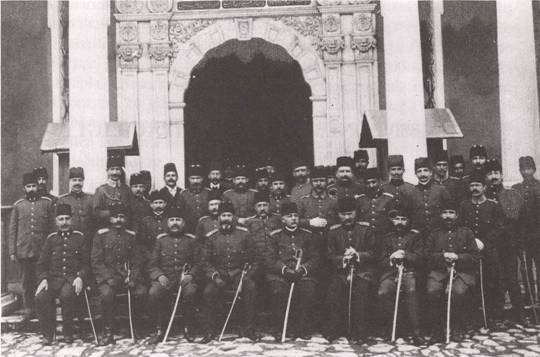
Ottoman Engineers graduate from the Imperial School of Engineering
Following their successful initiation in the Silesian Campaign, the Porte therefore decided to begin training engineer divisions to attach to all of the armies of the Empire; whilst also embarking on an ambitious reform program to modernise our weapons and munitions - and to significantly expand our officer corps. The standard muzzle-loaded rifles of the Ottoman Army were replaced by the newer breech-loaded variants that had become the European norm, and our outdated muzzle-loaded artillery was replaced by the improved breech-loaded artillery that our Austrian allies had pioneered.
Grand Vizier Abdulaziz’s decision to reject further political forms entirely whilst the military reform process was ongoing was not uncontroversial within the Porte, however. Whilst the Conservative Faction was naturally on board with such proposals, the Liberals were more torn. Those loyal to former Grand Vizier Resid Pasha, who still commanded great respect and influence behind the scenes, were in favour of continuing to push for greater political liberalisation. But there were other liberals in the faction who were more open to Abdulaziz, and willing to compromise on the political side in the face of such military necessity.
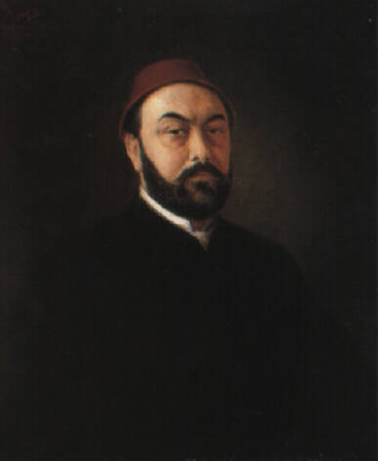
Grand Vizier Abdulaziz of House Osmanli
This quarrel eventually became more and more pronounced in 1859, with the public disagreements leading to a greater Conservative influence in the Porte in general, which in turn gave Grand Vizier Abdulaziz more of a free hand. Abdulaziz himself was a great lover of the sea, and he began to restore the long underfunded Ottoman Navy. For the first time in many years, funds were set aside to expand this, although the priority remained on transport vessels at first. Abdulaziz wanted to be able to move entire armies around the Mediterranean & Black Seas at will, from Tripolitania to Montenegro, Palestine to Salonika, and Trabzon to Cyprus. Any rebellions or foreign invasions could thus be dealt with far more rapidly than the extremely long overland journeys.
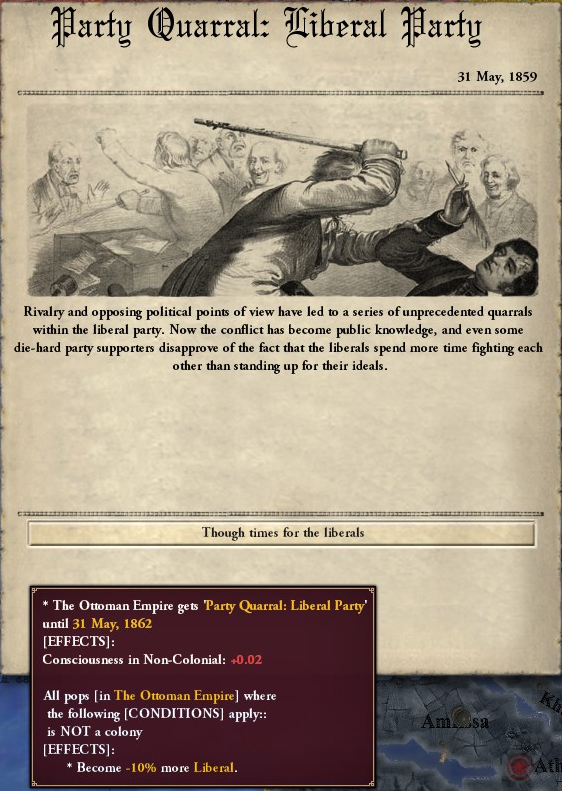
The Sublime Porte's Liberal Faction were racked with internal division in 1859
Meanwhile, our allies in Austria-Hungary were still reeling from their failure in the recent war. Rebellions were breaking out across much of the Habsburg lands by minorities angered at not getting the same treatment the Hungarians now had. Poles, Ukrainians, Croatians, and Italians all rose up in 1859. At the request of our overstretched allies, Grand Vizier Abdulaziz authorised the Army of Bosnia to march to the Dalmatian Coastline and help deal with the Croatian rebels there. With many Croats in the Vilayet of Bosnia, the Porte was in firm agreement that an independent Croatian state on our borders would be of absolutely no interest to us.
Unfortunately in August 1859, the North German Federation decided to flex their new muscle and back the Croatian cause. This caused a new international crisis, with the North German Federation and the Croats on one side and the Austro-Hungarian Empire on the other. The Porte moved quickly to back the Habsburg cause, but a repeat conflict after less than a year’s respite would surely yield a hefty defeat if it went to war - something which the rest of Europe had also (thankfully) taken note of.
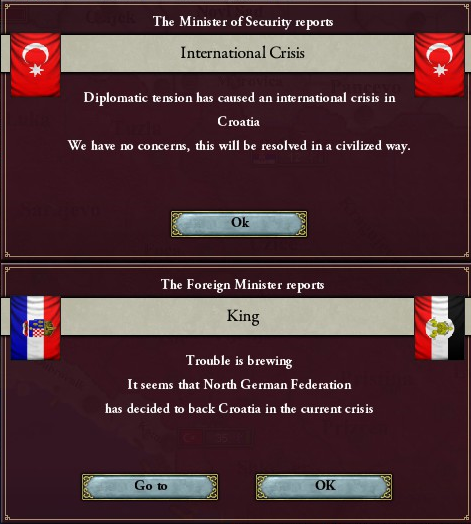
The Croatian International Crisis Begins (August 24th 1859)
The Kingdom of France had noted the rising power and unity of the North Germans in the past few years with great alarm. Since their foreign policy missteps of the 1840s and early 1850s, France had remained diplomatically isolated through much of Europe, but without any serious threats on its borders. The formation of the North German Federation had flipped this on its head, with whispers of German irredentist claims on lands once claimed by the Holy Roman Empire reaching the ears of the Parisian government.
And so, despite their great rivalry over the Italian states, the Habsburg Government offered a suggestion to the French: The Duchy of Holstein - which had a ruler with marriage ties to the Habsburg dynasty - would be released from the North German Federation into the Habsburg Sphere, with additional French influence. This would further isolate Schleswig to the North and potentially tempt the Danes into attempting to reclaim it in future. By releasing one state from the Federation, the Habsburgs hoped that many more would follow and the power of Prussia could be broken. France backed this proposal, and publically denounced the Croatians as a result.
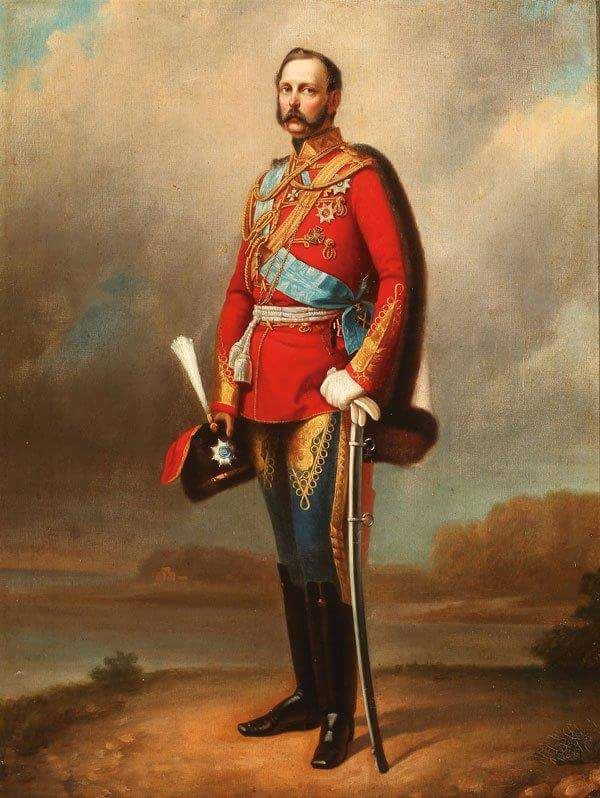
Tsar Alexander II of the Russian Empire
The new Russian Tsar, Alexander II, whilst naturally supportive of all Slavic revolts, was also greatly concerned by the rising power of the Prussians. Russia’s relations with the Habsburgs were far better than their relations with the Hohenzollerns, and Alexander was concerned that if the Habsburg Empire fell apart entirely, then the Prussians could become a hegemon over the entire continent - threatening not only Russian Poland but also seeking to integrate the large German minorities in the Russian Baltic.
Russia, too, therefore joined the international coalition condemning the North German Federation for stirring up the seeds of another war. On November 23rd, facing hostility on all sides, the North German Federation was forced into a humiliating climbdown, and the Duchy of Holstein seceded as a Habsburg ally. Ottoman forces thus moved into Dalmatia once again to crush the remaining Croatian rebels, whilst the Habsburg’s continued to struggle to deal with the large rebellions in Venetia and Lombardy.
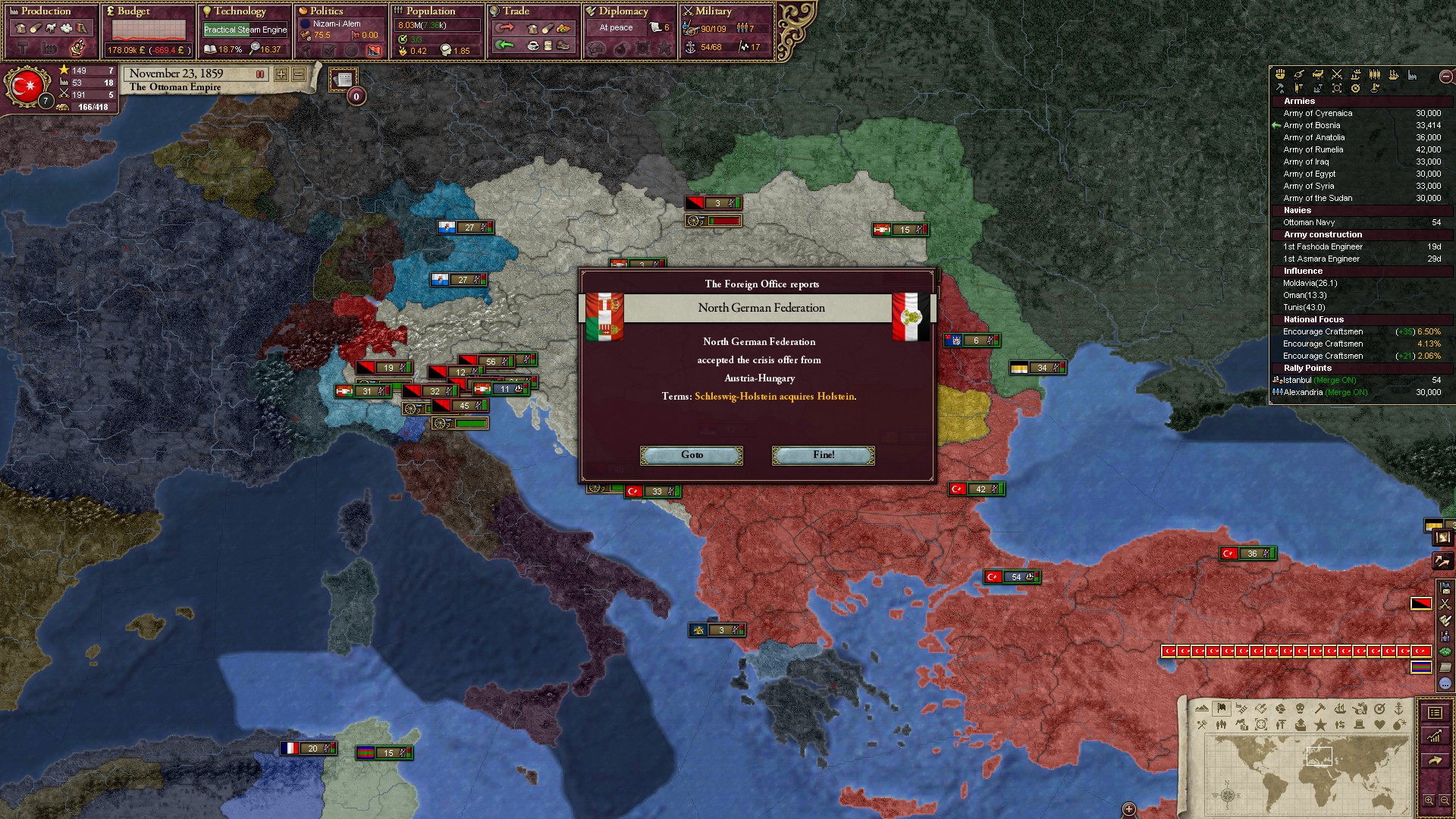
The Hohenzollern's are forced to back down, but rebellions continue in Austria-Hungary (November 23rd 1859)
Peace, however, would continue to elude Europe. The French, emboldened by the humbling of the Prussians, were taking great notice of the Habsburg troubles in dealing with their Italian rebellions. In winter 1859, the French government formed a secret alliance with the Kingdom of Sardinia-Piedmont in Italy, known as the Pact of Plombieres, the terms of which would soon become obvious to the rest of Europe. France wished to increase its own influence in Italy, whilst Sardinia-Piedmont dreamed of uniting all Italians under its flag: Both needed to see the Habsburgs forced out of the Peninsula to achieve their goals.
Consequently, at the turn of the New Year and with the Habsburg’s still facing widespread rebellions, France sent an ultimatum to Vienna. The French were demanding that Austria cede the entire Duchy of Lombardy to the Kingdom of Sardinia-Piedmont, knowing that Venetia would surely win its rebellion if it could be armed over land. The Habsburg’s naturally refused. And so, on January 3rd, France declared war, with its allies in Sardinia-Piedmont following suit - along with the Pope, who was a longtime French ally. The Pact of the Great Dynasties was thus triggered once again.
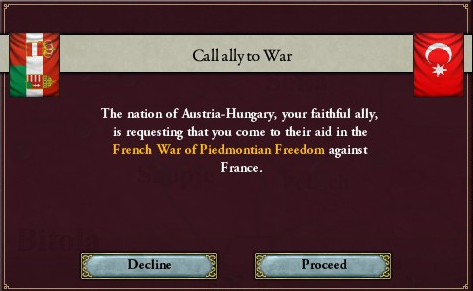
These Engineer brigades, widespread in Western Europe but previously unused by the Ottoman Armed Forces, were units dedicated to expertise in explosives and fortifications. Whilst artillery had long been used to target widespread areas in battle, these new engineers were a throwback to the “Sapper” brigades of medieval times. They were experts in the handling of explosives to destroy enemy fortifications, as well as the building of pontoon bridges across rivers, and the rapid digging of trench and palisade systems to help our own forces “dig-in”.

Ottoman Engineers graduate from the Imperial School of Engineering
Following their successful initiation in the Silesian Campaign, the Porte therefore decided to begin training engineer divisions to attach to all of the armies of the Empire; whilst also embarking on an ambitious reform program to modernise our weapons and munitions - and to significantly expand our officer corps. The standard muzzle-loaded rifles of the Ottoman Army were replaced by the newer breech-loaded variants that had become the European norm, and our outdated muzzle-loaded artillery was replaced by the improved breech-loaded artillery that our Austrian allies had pioneered.
Grand Vizier Abdulaziz’s decision to reject further political forms entirely whilst the military reform process was ongoing was not uncontroversial within the Porte, however. Whilst the Conservative Faction was naturally on board with such proposals, the Liberals were more torn. Those loyal to former Grand Vizier Resid Pasha, who still commanded great respect and influence behind the scenes, were in favour of continuing to push for greater political liberalisation. But there were other liberals in the faction who were more open to Abdulaziz, and willing to compromise on the political side in the face of such military necessity.

Grand Vizier Abdulaziz of House Osmanli
This quarrel eventually became more and more pronounced in 1859, with the public disagreements leading to a greater Conservative influence in the Porte in general, which in turn gave Grand Vizier Abdulaziz more of a free hand. Abdulaziz himself was a great lover of the sea, and he began to restore the long underfunded Ottoman Navy. For the first time in many years, funds were set aside to expand this, although the priority remained on transport vessels at first. Abdulaziz wanted to be able to move entire armies around the Mediterranean & Black Seas at will, from Tripolitania to Montenegro, Palestine to Salonika, and Trabzon to Cyprus. Any rebellions or foreign invasions could thus be dealt with far more rapidly than the extremely long overland journeys.

The Sublime Porte's Liberal Faction were racked with internal division in 1859
Meanwhile, our allies in Austria-Hungary were still reeling from their failure in the recent war. Rebellions were breaking out across much of the Habsburg lands by minorities angered at not getting the same treatment the Hungarians now had. Poles, Ukrainians, Croatians, and Italians all rose up in 1859. At the request of our overstretched allies, Grand Vizier Abdulaziz authorised the Army of Bosnia to march to the Dalmatian Coastline and help deal with the Croatian rebels there. With many Croats in the Vilayet of Bosnia, the Porte was in firm agreement that an independent Croatian state on our borders would be of absolutely no interest to us.
Unfortunately in August 1859, the North German Federation decided to flex their new muscle and back the Croatian cause. This caused a new international crisis, with the North German Federation and the Croats on one side and the Austro-Hungarian Empire on the other. The Porte moved quickly to back the Habsburg cause, but a repeat conflict after less than a year’s respite would surely yield a hefty defeat if it went to war - something which the rest of Europe had also (thankfully) taken note of.

The Croatian International Crisis Begins (August 24th 1859)
The Kingdom of France had noted the rising power and unity of the North Germans in the past few years with great alarm. Since their foreign policy missteps of the 1840s and early 1850s, France had remained diplomatically isolated through much of Europe, but without any serious threats on its borders. The formation of the North German Federation had flipped this on its head, with whispers of German irredentist claims on lands once claimed by the Holy Roman Empire reaching the ears of the Parisian government.
And so, despite their great rivalry over the Italian states, the Habsburg Government offered a suggestion to the French: The Duchy of Holstein - which had a ruler with marriage ties to the Habsburg dynasty - would be released from the North German Federation into the Habsburg Sphere, with additional French influence. This would further isolate Schleswig to the North and potentially tempt the Danes into attempting to reclaim it in future. By releasing one state from the Federation, the Habsburgs hoped that many more would follow and the power of Prussia could be broken. France backed this proposal, and publically denounced the Croatians as a result.

Tsar Alexander II of the Russian Empire
The new Russian Tsar, Alexander II, whilst naturally supportive of all Slavic revolts, was also greatly concerned by the rising power of the Prussians. Russia’s relations with the Habsburgs were far better than their relations with the Hohenzollerns, and Alexander was concerned that if the Habsburg Empire fell apart entirely, then the Prussians could become a hegemon over the entire continent - threatening not only Russian Poland but also seeking to integrate the large German minorities in the Russian Baltic.
Russia, too, therefore joined the international coalition condemning the North German Federation for stirring up the seeds of another war. On November 23rd, facing hostility on all sides, the North German Federation was forced into a humiliating climbdown, and the Duchy of Holstein seceded as a Habsburg ally. Ottoman forces thus moved into Dalmatia once again to crush the remaining Croatian rebels, whilst the Habsburg’s continued to struggle to deal with the large rebellions in Venetia and Lombardy.

The Hohenzollern's are forced to back down, but rebellions continue in Austria-Hungary (November 23rd 1859)
Peace, however, would continue to elude Europe. The French, emboldened by the humbling of the Prussians, were taking great notice of the Habsburg troubles in dealing with their Italian rebellions. In winter 1859, the French government formed a secret alliance with the Kingdom of Sardinia-Piedmont in Italy, known as the Pact of Plombieres, the terms of which would soon become obvious to the rest of Europe. France wished to increase its own influence in Italy, whilst Sardinia-Piedmont dreamed of uniting all Italians under its flag: Both needed to see the Habsburgs forced out of the Peninsula to achieve their goals.
Consequently, at the turn of the New Year and with the Habsburg’s still facing widespread rebellions, France sent an ultimatum to Vienna. The French were demanding that Austria cede the entire Duchy of Lombardy to the Kingdom of Sardinia-Piedmont, knowing that Venetia would surely win its rebellion if it could be armed over land. The Habsburg’s naturally refused. And so, on January 3rd, France declared war, with its allies in Sardinia-Piedmont following suit - along with the Pope, who was a longtime French ally. The Pact of the Great Dynasties was thus triggered once again.

- 1
Threadmarks
View all 63 threadmarks
Reader mode
Reader mode

